It can be difficult to choose between Ai email marketing tools because the right tool can significantly affect the effectiveness of email campaigns. To ease your burden, we present you with some of the best email marketing software that can help you get the job done.

Grow your business with customer experience automation
- Reach:Use precise targeting to find the right prospe
- Nurture: Grow your relationship with your audience by providing tailored guidance.
- Convert: Provide individual audience members with well-timed calls to take the next step.
- Grow: Delight each customer by knowing what they want, when they want it.

Keep customers ready to buy with optimized content
- Premium: Our most advanced tools, unlimited contacts, and priority support; built for teams.
- Standard:Sell even more with personalization, optimization tools, and enhanced automations.
- Essentials: Send the right content at the right time with testing and scheduling features.
- Free
- Easily: create email campaigns and learn more about your customers.

Attract new customers and boost sales with our complete, easy-to-use digital marketing suite.
- Email Marketing: You’re in the right place. We’ve helped millions of people just like you.
- NEW! SMS Marketing: upgrade your marketing with a new way to capture attention.
- Social Media Marketing: schedule posts, create ads and more for all your accounts, all in one place.
- Marketing Automation: develop customer relationships with advanced marketing automation tools.
According to the latest research from Statista, there are 3.9 billion email users worldwide in 2019 and the number is expected to increase to 4.48 billion people in 2024. Therefore, email marketing services are valued. Price is still an effective channel to reach potential customers for businesses.
Choosing the right email marketing software is crucial to building a loyal customer list. From sending personalized emails to tracking engagement, the best email marketing software can help you achieve your goals. If you are looking for an email marketing solution but still wondering about the provider, Minh Media will introduce you to the top Ai email marketing tools for businesses today, along with a few reference options. mine so you can choose the best software.
What is Ai email marketing tools?
Ai email marketing tools refers to the use of AI email as a tool to promote products, services, or brands to a targeted audience. It involves sending commercial messages to a group of people who have either subscribed to a company’s email list or have expressed interest in receiving such messages.
Ai email marketing tools provide businesses with a platform to create and send email campaigns with automation flow from A to Z, manage email lists, track email opens, clicks and conversions, automate email sequences, and analyze campaign performance.
These services help businesses build relationships with their customers by providing relevant and timely information, promoting products or services, and keeping them updated on company news and events.
Ai email marketing tools can be used by businesses of all sizes and industries to reach their target audience and achieve their marketing goals.
Ai email marketing tools typically offer a variety of features and tools to help businesses create effective email campaigns. Some of the common features offered by email marketing services include:
Email Templates: Most Ai email marketing tools offer a variety of pre-designed email templates that can be customized to match a brand’s unique style and messaging.
Subscriber Management: Ai email marketing tools provide tools to manage email subscribers, including the ability to add and remove subscribers, segment subscribers based on demographics or behavior, and track subscriber engagement.
Campaign Tracking and Analytics: Ai email marketing tools provide detailed reports on campaign performance, including open rates, click-through rates, conversions, and other important metrics.
Automated Campaigns: Many Ai email marketing tools offer the ability to create automated email campaigns that are triggered by specific actions or behaviors, such as a new subscriber joining a list, a subscriber making a purchase, or a subscriber abandoning a shopping cart.
A/B Testing: A/B testing allows businesses to test different email subject lines, content, and calls to action to determine which perform best with their audience.
Ai email marketing tools provide businesses with a powerful tool to reach and engage with their target audience, build brand awareness, and drive conversions.
#1 ActiveCampaign – Ai email marketing tools: The 1 Automation Platform
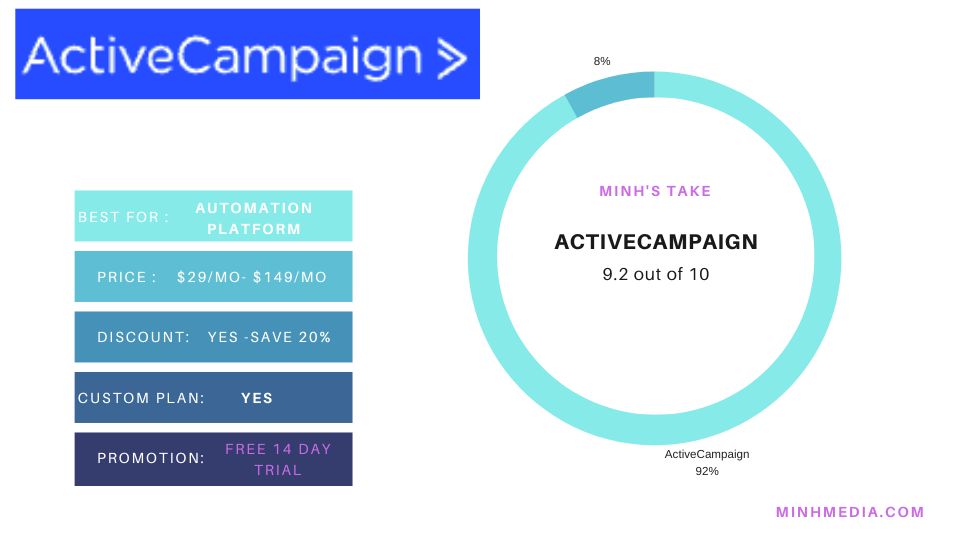
ActiveCampaign is a pall- grounded marketing robotization platform that helps businesses of all sizes automate marketing juggernauts, engage with guests, and grow their businesses. Then’s a detailed preface to the ActiveCampaign platform
History
ActiveCampaign was innovated in 2003 by Jason VandeBoom and it was firstly a consulting company. still, in 2013, the company shifted its focus to dispatch marketing and marketing robotization, which has since grown to come one of the leading marketing robotization platforms in the assiduity. ActiveCampaign is headquartered in Chicago, Illinois and has services in Sydney, Australia and Dublin, Ireland.
Technology
ActiveCampaign is erected on a foundation of ultramodern technologies, includingReact.js,Node.js and Ruby on Rails. The platform is designed to be flexible and scalable, and can meet the requirements of businesses of all sizes. ActiveCampaign uses artificial intelligence and machine literacy to shoot substantiated announcements and recommendations to guests, and integrates with a variety of third- party apps and services.
Achievement
ActiveCampaign has won several awards for its marketing robotization platform, including being named a leader in the G2 Marketing robotization Grid, Stylish Marketing robotization result at MarTech Advance Awards 2019 and Stylish Marketing robotization Software at SaaS Awards 2019. also, the company has been honored for its plant culture and has been honored by Inc Magazine. and Build In Chicago named Stylish Place to Work.
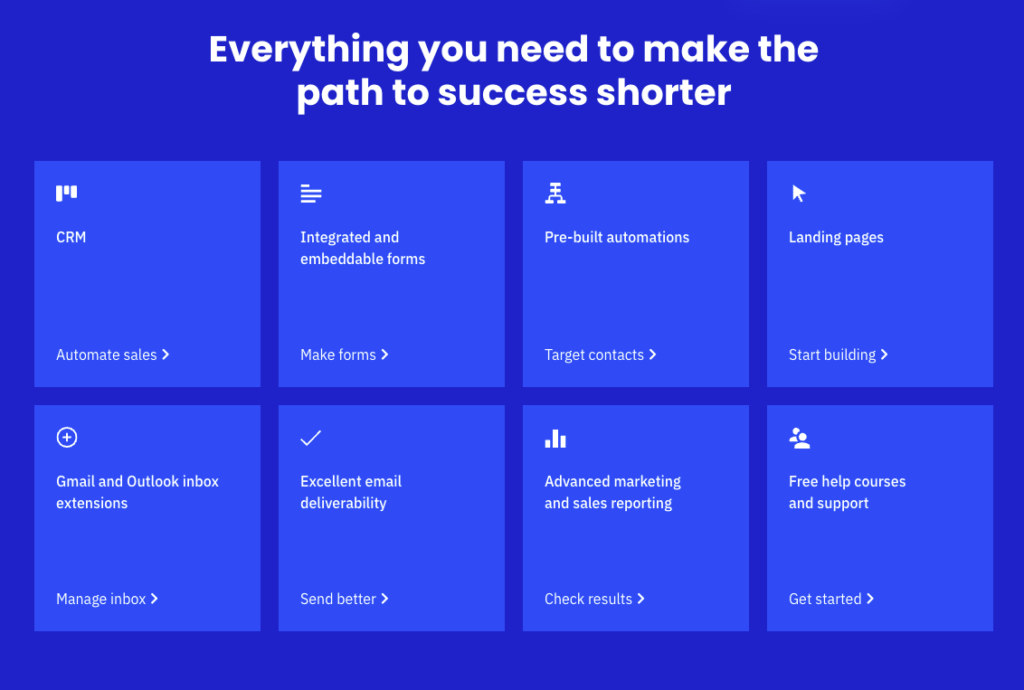
Featured
- ActiveCampaign offers many features to help businesses automate their marketing campaigns and engage with their customers. Some of the key features of the platform include:
- Email Marketing: ActiveCampaign offers a drag-and-drop email builder and various email templates to help businesses create effective email campaigns.
- Marketing Automation: The platform allows businesses to automate their marketing campaigns based on customer behavior, such as website visits, email openings, and purchases.
- CRM: ActiveCampaign provides a CRM system to help businesses manage customer data, track sales, and create customer profiles.
- Personalization: The platform uses artificial intelligence and machine learning to send personalized messages and recommendations to customers based on their behavior and preferences.
- Integrations: ActiveCampaign integrates with many third-party apps and services, including Salesforce, Shopify, and WordPress.
- ActiveCampaign is a important marketing robotization platform that helps businesses automate marketing juggernauts, engage with guests, and grow their businesses.
Pros of ActiveCampaign:
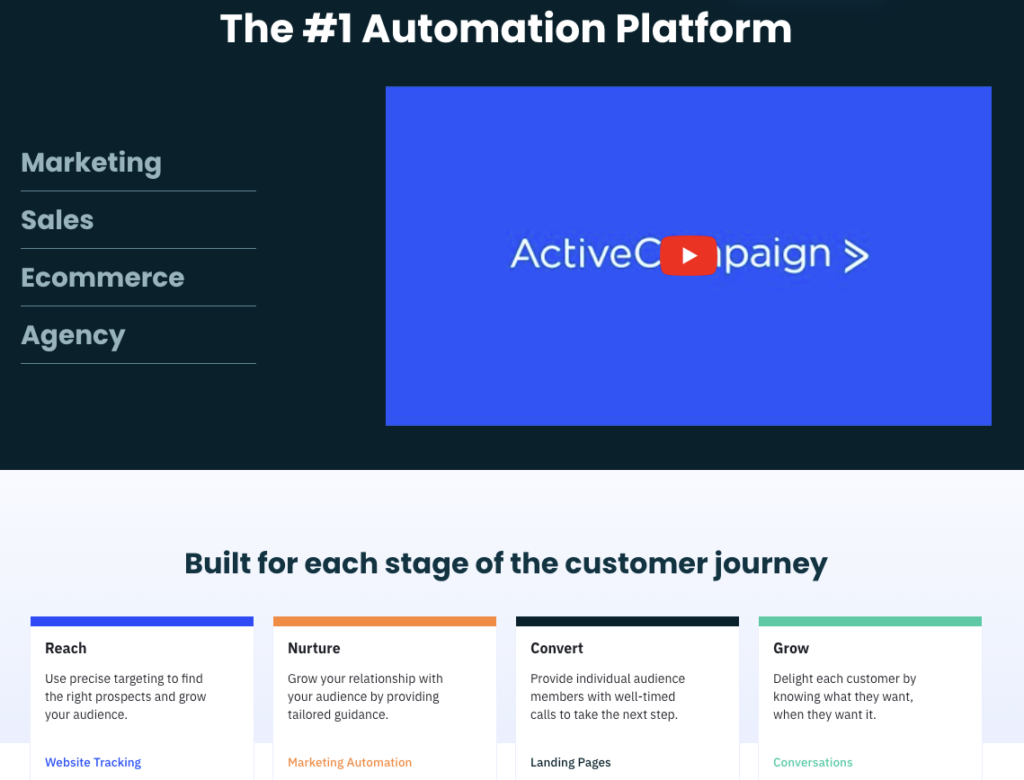
- Powerful Marketing Automation: ActiveCampaign’s marketing automation capabilities are among the most powerful in the industry. The platform’s automation workflows are highly customizable and can be triggered by a wide range of customer behaviors.
- Advanced Personalization: ActiveCampaign uses artificial intelligence and machine learning to deliver highly personalized messages and recommendations to customers. This can help businesses improve customer engagement and increase conversions.
- Robust CRM: ActiveCampaign’s built-in CRM system allows businesses to manage their customer data, track sales, and create customer profiles. This can help businesses improve their customer relationships and make more informed marketing decisions.
- Comprehensive Integrations: ActiveCampaign integrates with a wide range of third-party applications and services, which can help businesses streamline their marketing and sales workflows.
- Great Support: ActiveCampaign offers excellent customer support, with a responsive support team and a variety of resources, including a knowledge base, video tutorials, and a community forum.
Cons of ActiveCampaign:
- Steep Learning Curve: ActiveCampaign’s platform can be complex and difficult to navigate, which can make it challenging for new users to get started.
- Price: ActiveCampaign’s pricing plans can be somewhat expensive compared to other marketing automation platforms, which can make it less accessible for smaller businesses.
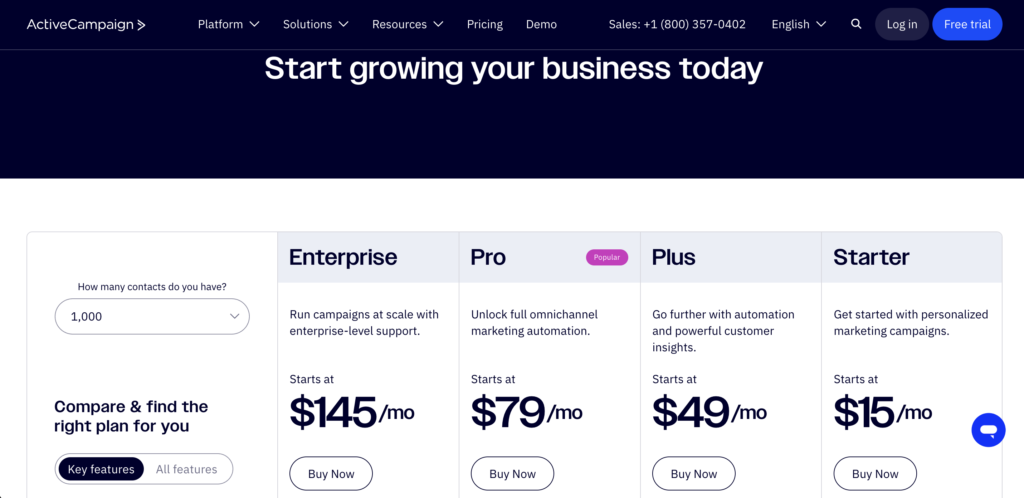
ActiveCampaign offers a variety of pricing plans based on the number of contacts a business has and the features they require. Here is an overview of ActiveCampaign’s pricing plans:
- Lite Plan: The Lite Plan starts at $15 per month and includes email marketing, marketing automation, and a CRM with up to 1000 contacts.
- Plus Plan: The Plus Plan starts at $49 per month and includes all the features of the Lite Plan, as well as SMS marketing, landing pages, and lead scoring. The Plus Plan supports up to 25,000 contacts.
- Professional Plan: The Professional Plan starts at $79 per month and includes all the features of the Plus Plan, as well as predictive sending, site messaging, and attribution reporting. The Professional Plan supports up to 50,000 contacts.
- Enterprise Plan: The Enterprise Plan starts at $145 per month designed for businesses with more than 50,000 contacts. This plan includes all the features of the Professional Plan, as well as custom reporting, custom mailserver domain, and a dedicated account rep.
ActiveCampaign also offers a 14-day free trial, which allows businesses to try out the platform before committing to a paid plan. Additionally, businesses can save up to 20% on their subscription by paying annually instead of monthly.
#2 MailChimp : Launch, build, and grow your business with the email marketing and automations brand*.
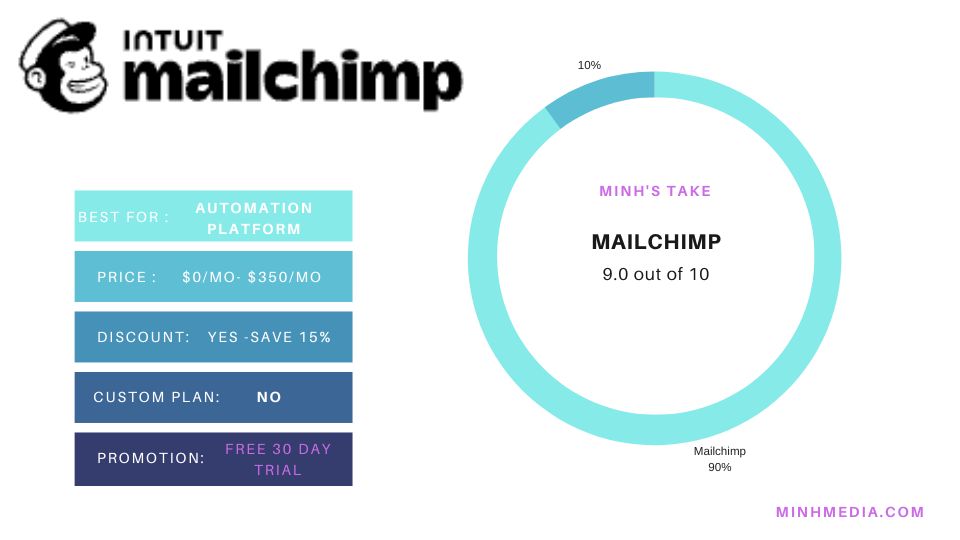
MailChimp is a popular Ai email marketing tools that helps businesses create and manage email campaigns, automate marketing tasks, and analyze campaign performance. Here is a detailed introduction to MailChimp:
History:
MailChimp was founded in 2001 by Ben Chestnut and Dan Kurzius as a side project to help small businesses automate their email marketing. Over the years, it has grown into one of the most widely used email marketing platforms, serving millions of customers worldwide. In 2019, MailChimp rebranded to “Mailchimp” to reflect its expanded offerings beyond email marketing.
Technology:
Mailchimp is a cloud-based platform, which means it is accessed online and does not require any software installation. It uses a combination of HTML and CSS for creating email templates, and offers a visual drag-and-drop editor for designing emails without coding. Mailchimp also supports integration with third-party applications and services, allowing businesses to connect their email marketing efforts with other tools and platforms.
Achievements:
Mailchimp has received several awards and accolades over the years, including being named as one of the “Best Places to Work” by Fortune magazine and “Ai email marketing tools” by G2 Crowd. Mailchimp has also been recognized for its commitment to sustainability and social responsibility, with initiatives such as its “Freddie’s Flowers” campaign, which promotes sustainable flower farming practices.
Features:
Mailchimp offers a wide range of features to help businesses create and manage effective email campaigns, including:
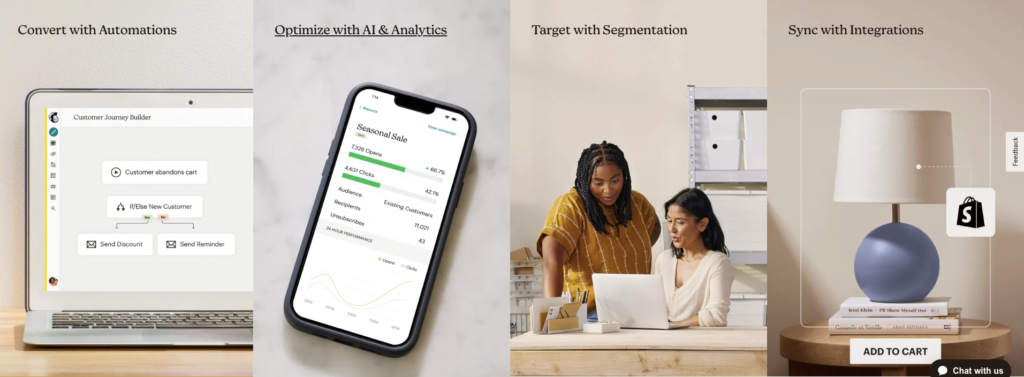
Email Campaigns: Mailchimp provides a variety of customizable email templates, a visual editor for designing emails, and features for personalization, segmentation, and A/B testing.
Automation: Mailchimp’s automation features allow businesses to set up automated email campaigns based on triggers such as subscriber behavior, birthdays, or eCommerce activity, helping businesses save time and deliver relevant messages to their subscribers.
Analytics: Mailchimp offers detailed analytics and reporting to help businesses track the performance of their email campaigns, including open rates, click-through rates, and conversion rates. This allows businesses to optimize their campaigns and make data-driven decisions.
List Management: Mailchimp provides tools for managing email lists, including segmentation, tagging, and list hygiene features to help businesses keep their lists clean and organized.
Integrations: Mailchimp integrates with a wide range of third-party applications and services, including eCommerce platforms, CRM systems, social media, and more, allowing businesses to connect their email marketing efforts with other tools and platforms.
Landing Pages: Mailchimp allows businesses to create landing pages to capture leads, promote products or events, and grow their email list, all within the platform.
Mobile App: Mailchimp has a mobile app that allows users to manage their email campaigns, track performance, and monitor their account on the go.
Mailchimp offers a comprehensive set of features to help businesses create, manage, and optimize their email marketing campaigns, making it a popular choice for small and large businesses alike.
Marketing CRM: Mailchimp includes a built-in customer relationship management (CRM) tool that allows businesses to manage their contacts, track their interactions, and segment their audience based on various criteria such as demographics, behavior, and engagement. This helps businesses better understand their customers and deliver targeted and personalized email campaigns.
eCommerce Features: Mailchimp offers a range of eCommerce features, including integrations with popular eCommerce platforms such as Shopify, WooCommerce, and Magento. This allows businesses to sync their online store data with Mailchimp, create automated campaigns for abandoned carts, product recommendations, and post-purchase follow-ups, and track eCommerce revenue and ROI.
Social Media Ads: Mailchimp provides tools for creating and managing social media ad campaigns on platforms such as Facebook and Instagram. Businesses can create ads, target specific audience segments, and track their ad performance, all within the Mailchimp platform.
Advanced Segmentation and Personalization: Mailchimp allows businesses to create advanced segments based on various criteria such as subscriber behavior, engagement, and demographics. This enables businesses to send highly targeted and personalized emails to specific segments of their audience, increasing the relevance and effectiveness of their campaigns.
Multi-Channel Marketing: In addition to email marketing, Mailchimp offers other channels for reaching and engaging with customers, such as social media, landing pages, postcards, and more. This allows businesses to create multi-channel marketing campaigns and reach their audience through different touchpoints.
Templates and Design Tools: Mailchimp offers a wide range of customizable email templates and a visual drag-and-drop editor for creating professional-looking emails without any coding skills. Businesses can also upload their own HTML templates or use Mailchimp’s design tools to create landing pages and social media ads.
Support and Resources: Mailchimp provides various resources and support options, including online help documentation, tutorials, webinars, and a community forum. Paid plans also include priority support through email and chat, helping businesses get the assistance they need to optimize their email marketing efforts.
Mailchimp offers a robust and feature-rich platform for businesses to create, automate, and analyze their email marketing campaigns, as well as other marketing channels. However, it’s important to note that Mailchimp’s pricing is based on the number of subscribers, and as the subscriber list grows, the cost may increase significantly. Businesses should carefully consider their budget and needs when choosing a plan.
Here are some pros and cons of using Mailchimp for email marketing:
Pros:
- User-Friendly Interface: Mailchimp offers a user-friendly interface with a visual drag-and-drop email editor, making it easy for businesses to create professional-looking emails without coding skills.
- Automation Features: Mailchimp provides robust automation features that allow businesses to set up automated email campaigns based on triggers and events, saving time and effort in managing campaigns manually.
- Integrations: Mailchimp integrates with a wide range of third-party applications and services, allowing businesses to connect their email marketing efforts with other tools and platforms, such as eCommerce platforms, CRMs, and social media.
- Advanced Segmentation and Personalization: Mailchimp offers advanced segmentation and personalization options, allowing businesses to send highly targeted and personalized emails to specific segments of their audience, increasing the relevance and effectiveness of their campaigns.
- Analytics and Reporting: Mailchimp provides detailed analytics and reporting features that allow businesses to track the performance of their email campaigns, including open rates, click-through rates, and conversion rates, helping them make data-driven decisions and optimize their campaigns.
- Multi-Channel Marketing: In addition to email marketing, Mailchimp offers other channels such as social media, landing pages, and postcards, allowing businesses to create multi-channel marketing campaigns and reach their audience through different touchpoints.
Cons:
- Pricing: Mailchimp’s pricing is based on the number of subscribers, and as the subscriber list grows, the cost may increase significantly. This can be a potential downside for businesses with large subscriber lists or tight budgets.
- Limited Automation on Free Plan: The free plan of Mailchimp has limited automation features, which means businesses may need to upgrade to a paid plan to access more advanced automation options.
- Template Customization: While Mailchimp offers a wide range of email templates, customizing them beyond basic changes may require HTML coding skills, which can be a limitation for businesses without coding expertise.
- Deliverability Issues: Some users have reported issues with email deliverability, where emails sent through Mailchimp may land in spam folders or not reach the recipient’s inbox. However, Mailchimp provides tools and best practices to improve deliverability.
- Limited Customer Support: While Mailchimp offers online help documentation and a community forum, customer support may be limited for free plan users, and priority support through email and chat is available only for paid plans.
Mailchimp offers a feature-rich and user-friendly platform for Ai email marketing tools, but businesses should carefully consider their budget, customization needs, and deliverability requirements when evaluating its pros and cons.
Mailchimp offers a variety of pricing plans to suit different business needs. Here’s an overview of their pricing structure:
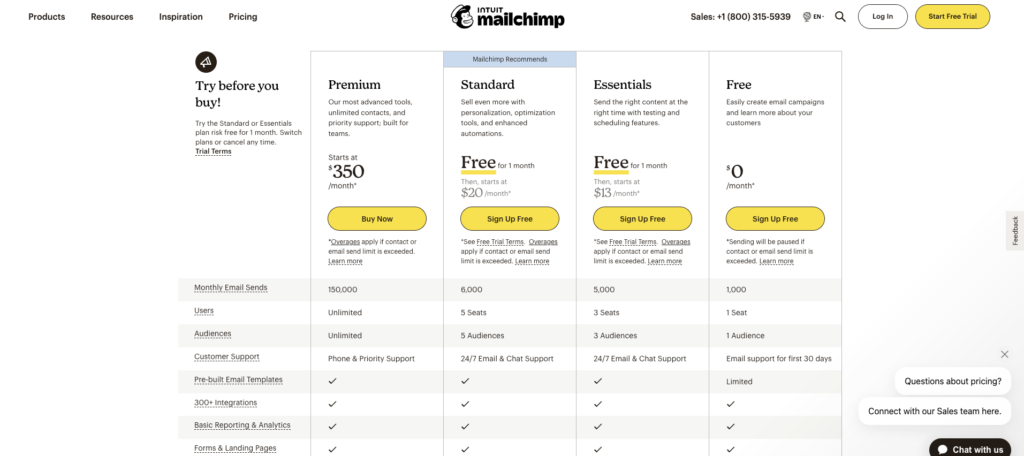
- Free Plan: Mailchimp offers a free plan with basic features that allows businesses to send up to 500 subscribers and 1,000 emails per month. However, it has limited automation features and does not include advanced features such as A/B testing or multi-step automation.
- Essentials Plan: The Essentials Plan starts at $13.00 per month and includes features such as custom branding, A/B testing, automation, and basic templates. It allows businesses to send up to 50,000 subscribers, but the email volume is capped at a certain limit depending on the plan tier.
- Standard Plan: The Standard Plan starts at $20.00 per month and includes all the features of the Essentials Plan, as well as advanced templates, behavioral targeting, and custom-coded templates. It allows businesses to send up to 100,000 subscribers, with higher email volume limits.
- Premium Plan: The Premium Plan is designed for larger businesses and starts at $350 per month. It includes all the features of the Standard Plan, along with additional features such as advanced segmentation, multivariate testing, and phone support. It allows businesses to send to more than 200,000 subscribers, with higher email volume limits.
- Pay-As-You-Go Plan: Mailchimp also offers a Pay-As-You-Go Plan, which allows businesses to purchase email credits that can be used for sending emails. This plan is suitable for businesses with sporadic or seasonal email sending needs.
It’s important to note that Mailchimp’s pricing is based on the number of subscribers, and as the subscriber list grows, the cost may increase significantly. There are also additional add-ons and features available at an extra cost, such as additional users, advanced automation, and priority support.
Mailchimp also offers a 15% discount for non-profit organizations, as well as special pricing for high-volume senders and agencies. They also periodically run promotions and discounts, so it’s worth checking their website for any current offers.
Businesses should carefully evaluate their needs, budget, and the features offered by different plans to choose the one that best fits their requirements.
#3 Constant Contact : Craft the perfect message in the blink of an AI email marketing tools

Detailed introduction to Constant Contact, a popular AI email marketing tools:Give your email and digital marketing a glow up with our easy-to-use tools.
History: Constant Contact was founded in 1995 and is headquartered in Waltham, Massachusetts, USA. It is one of the oldest and most established email marketing platforms in the industry, with a long history of providing email marketing solutions to small and medium-sized businesses (SMBs) and non-profit organizations.
Technology: Constant Contact uses cloud-based technology to deliver its AI email marketing tools. It provides an intuitive web-based interface that allows businesses to create, customize, and send professional-looking emails without requiring any coding skills. Constant Contact also offers a variety of pre-designed email templates, along with a drag-and-drop email editor, making it easy for users to create visually appealing emails.
Achievements: Constant Contact has received several awards and recognition for its AI email marketing tools. Some of its notable achievements include:
- Stevie Award for Best Relationship Management Solution in 2019.
- 2020 Best Email Marketing Software by Capterra.
- 2020 Top Email Marketing Provider by G2 Crowd.
- 2020 Best Email Marketing Service by Business.com.

Features: Constant Contact offers a wide range of features designed to help businesses create, manage, and optimize their email marketing campaigns. Some of its key features include:
- Email Campaign Creation: Constant Contact provides an easy-to-use email editor with drag-and-drop functionality, along with a variety of pre-designed templates, allowing businesses to create professional-looking emails without coding skills.
- Contact Management: Constant Contact offers tools for managing contact lists, segmenting subscribers, and keeping track of engagement and interactions with subscribers.
- Automation: Constant Contact provides automation features such as autoresponders, triggered emails, and drip campaigns, allowing businesses to set up automated email sequences based on subscriber behavior or events.
- Reporting and Analytics: Constant Contact offers detailed analytics and reporting features that allow businesses to track the performance of their email campaigns, including open rates, click-through rates, and conversion rates, helping them make data-driven decisions and optimize their campaigns.
- Social Media Marketing: In addition to email marketing, Constant Contact offers social media marketing features, such as social media scheduling, content creation, and tracking, allowing businesses to integrate their email marketing efforts with their social media strategy.
- eCommerce Integration: Constant Contact integrates with popular eCommerce platforms, allowing businesses to create and send targeted email campaigns for their online stores, such as abandoned cart reminders, product promotions, and order confirmations.
- Event Management: Constant Contact offers event management features, allowing businesses to create and manage online events, send invitations and reminders, and track RSVPs and registrations.
- Support and Education: Constant Contact provides customer support through phone, email, chat, and an extensive knowledge base. They also offer webinars, tutorials, and guides to help businesses learn best practices and make the most of their email marketing campaigns.
Constant Contact offers a comprehensive set of features and tools for businesses to create, manage, and optimize their email marketing campaigns, with a focus on SMBs and non-profit organizations.
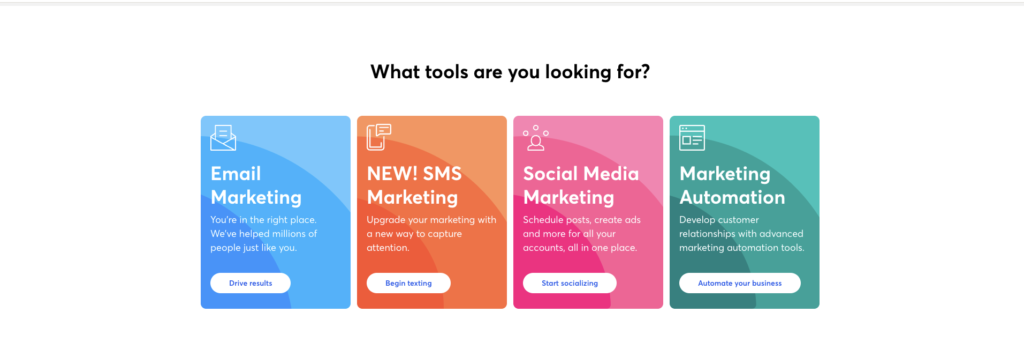
Pros of Constant Contact:
- User-friendly Interface: Constant Contact offers a user-friendly interface with a drag-and-drop email editor, making it easy for businesses to create professional-looking emails without requiring coding skills.
- Robust Automation Features: Constant Contact provides a variety of automation features, including autoresponders, triggered emails, and drip campaigns, allowing businesses to set up automated email sequences based on subscriber behavior or events.
- Wide Range of Templates: Constant Contact offers a large selection of pre-designed email templates that can be customized to suit various business needs and industries, saving time and effort in designing emails from scratch.
- Contact Management: Constant Contact provides tools for managing contact lists, segmenting subscribers, and keeping track of engagement and interactions with subscribers, allowing businesses to target their emails and personalize their campaigns.
- Reporting and Analytics: Constant Contact offers detailed analytics and reporting features that allow businesses to track the performance of their email campaigns, helping them make data-driven decisions and optimize their campaigns for better results.
- Social Media Marketing Integration: Constant Contact allows businesses to integrate their email marketing efforts with their social media strategy, offering social media scheduling, content creation, and tracking features.
- eCommerce Integration: Constant Contact integrates with popular eCommerce platforms, allowing businesses to create and send targeted email campaigns for their online stores, enhancing their eCommerce marketing efforts.
- Event Management: Constant Contact offers event management features, allowing businesses to create and manage online events, send invitations and reminders, and track RSVPs and registrations.
- Customer Support and Education: Constant Contact provides customer support through phone, email, chat, and an extensive knowledge base. They also offer webinars, tutorials, and guides to help businesses learn best practices and make the most of their email marketing campaigns.
Cons of Constant Contact:
- Pricing: Constant Contact’s pricing can be higher compared to some other email marketing platforms, especially for businesses with larger contact lists or more advanced features.
- Limited Customization Options: While Constant Contact offers a wide range of pre-designed templates, the customization options may be limited compared to some other platforms, which may not be suitable for businesses with specific design requirements.
- Learning Curve for Advanced Features: Constant Contact’s advanced features, such as automation and segmenting, may have a steeper learning curve for users who are not familiar with email marketing or automation concepts.
- Email Deliverability: Some users have reported issues with email deliverability, with emails ending up in the spam folder or not being delivered to certain email providers, which may affect the effectiveness of email campaigns.
- Limited A/B Testing: Constant Contact’s A/B testing capabilities are limited compared to some other platforms, which may not be suitable for businesses that rely heavily on A/B testing for optimizing their email campaigns.
- No Free Plan: Constant Contact does not offer a free plan, which may not be ideal for businesses with limited budgets or those looking for a free trial option.
- Limited Integrations: While Constant Contact offers integrations with popular eCommerce platforms and social media platforms, its integration options with other third-party apps and tools may be more limited compared to some other email marketing platforms.
It’s important to note that the pros and cons of Constant Contact may vary depending on the specific needs and requirements of each business, and it’s recommended to thoroughly evaluate the features, pricing, and customer support of the platform before making a decision.
Constant Contact offers different pricing plans to cater to the needs of different businesses. The pricing plans are based on the number of subscribers you have in your contact list, and some plans also offer additional features and benefits. Here are the basic pricing tiers for Constant Contact:
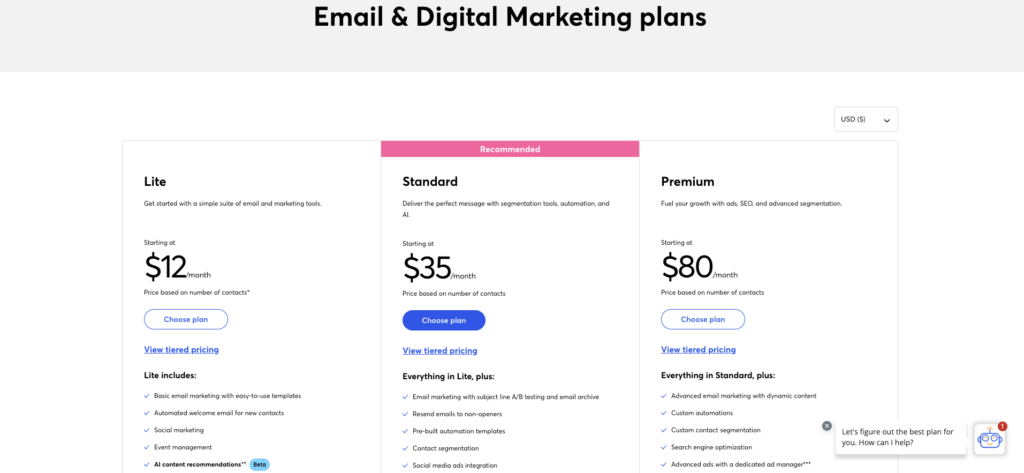
- Lite Plan: This plan starts at $12 per month for up to 500 subscribers and goes up to $335 per month for up to 50,000 subscribers. It includes features such as unlimited emails, customizable templates, list segmentation, reporting and analytics, and basic automation.
- Standard Plan: This plan starts at $35 per month for up to 500 subscribers and goes up to $335 per month for up to 50,000 subscribers. It includes all the features of the Email Plan, plus additional features such as advanced automation, A/B testing, landing pages, polls and surveys, and more.
- Premium Plan: Standard Plan: This plan starts at $80 per month.This plan is designed for businesses with larger contact lists and requires custom pricing. It includes features such as dedicated support, dedicated IP address, custom templates, and high-volume sending capabilities.
Constant Contact also offers discounts for prepaying for 6 or 12 months in advance, as well as a 30-day free trial for new users.
It’s important to note that pricing and features may vary and it’s recommended to visit Constant Contact’s website or contact their sales team for the most up-to-date and accurate pricing information based on your specific business requirements.
#4 Sendinblue : Take your digital marketing to the next level
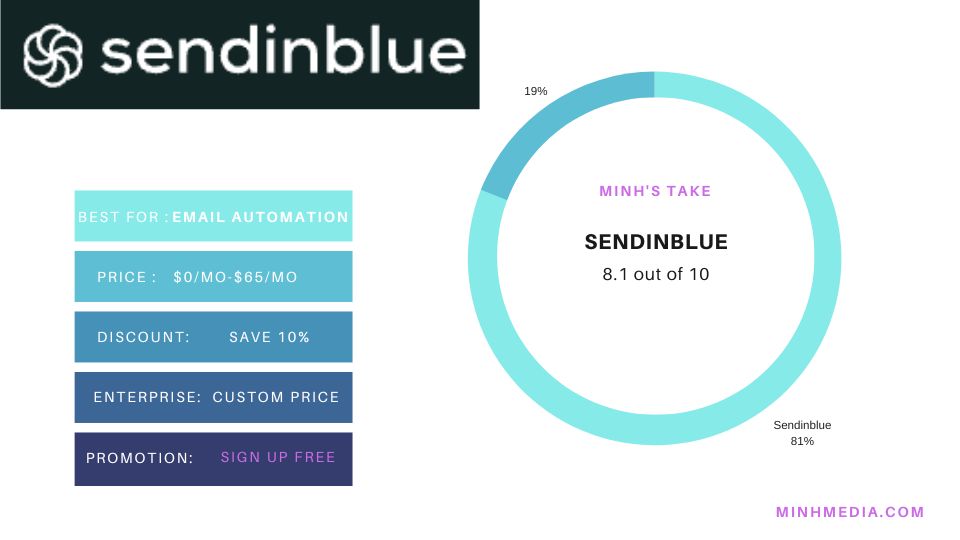
Sendinblue is a cloud-based marketing communication software that offers services such as AI email marketing tools, SMS marketing, landing pages, marketing automation, CRM, and more. The platform was founded in 2012 by Armand Thiberge and Kapil Sharma, with the goal of making marketing automation more accessible and affordable for small businesses.
In this article, we will explore the history, technology, achievements, and features of Sendinblue, and why it is a great choice for businesses of all sizes.
History:
Sendinblue started as a digital agency in Paris, France, before transitioning into a marketing automation software company in 2012. The founders realized that many small businesses were struggling to implement marketing automation due to the high costs and technical complexity of existing solutions.
They set out to build an easy-to-use, affordable, and effective marketing automation platform that could help businesses of all sizes streamline their marketing campaigns and grow their revenue.
Since its launch in 2012, Sendinblue has expanded rapidly, with offices in Paris, New York, and Noida. The company has also raised over $160 million in funding, and currently serves over 180,000 customers in more than 160 countries.
Technology:
Sendinblue’s platform is built on a robust and scalable technology stack that leverages cloud computing, big data, and machine learning to deliver powerful marketing automation capabilities to its users.
The platform uses a variety of technologies such as Node.js, Ruby on Rails, and PostgreSQL to ensure high performance, reliability, and security. It also integrates with popular third-party services such as Salesforce, Magento, WooCommerce, and more.
Sendinblue’s technology stack enables businesses to automate their marketing campaigns, track user behavior, and personalize their messages at scale, all from a single platform.
Achievements:
Over the years, Sendinblue has received numerous awards and accolades for its innovative platform and outstanding customer support. In 2018, the company was named one of the fastest-growing SaaS companies in Europe by SaaS 1000.
In 2019, Sendinblue was recognized as a leader in G2 Crowd’s email marketing grid report, with a 4.3 out of 5-star rating based on customer reviews. The company was also named one of the best AI email marketing tools solutions for small businesses by FitSmallBusiness.
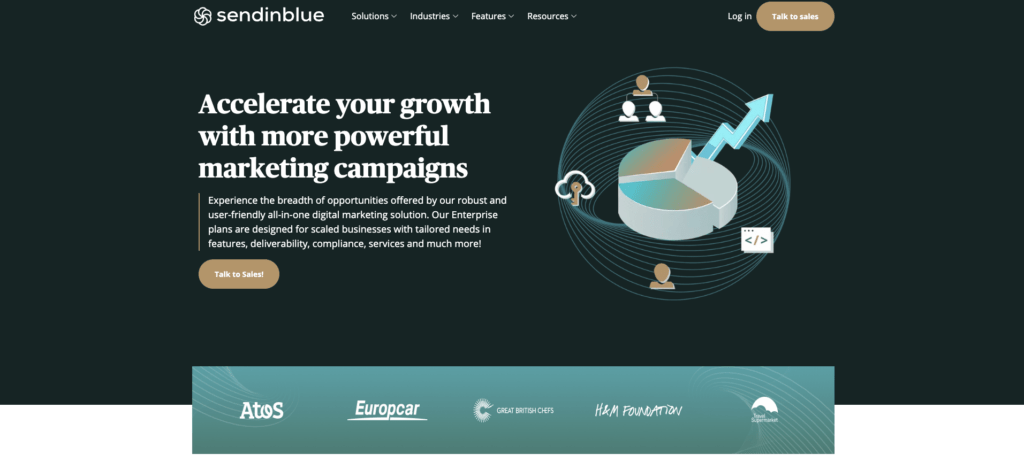
Key Features of Sendinblue
Sendinblue offers a comprehensive suite of features that empower businesses to create, optimize, and automate their email marketing campaigns. Here are some of the key features that make Sendinblue stand out in the market:
- Email Campaign Management: Sendinblue allows users to create professional-looking email campaigns using its intuitive drag-and-drop editor. Users can customize their emails with dynamic content, personalization tags, and responsive design, making their campaigns engaging and visually appealing.
- Marketing Automation: Sendinblue’s marketing automation features enable businesses to create automated workflows based on user behavior, segmentation, and triggers. This allows businesses to send targeted emails to their subscribers at the right time, ensuring maximum relevance and effectiveness.
- Contact Management: Sendinblue provides robust contact management capabilities, allowing businesses to organize and segment their contacts based on various criteria such as location, behavior, and engagement. This enables businesses to send highly targeted and personalized emails to specific segments of their audience.
- SMS Marketing: Sendinblue also offers SMS marketing capabilities, allowing businesses to send text messages to their subscribers for promotions, updates, and notifications. This adds another channel to their marketing arsenal, enabling them to reach their audience through multiple touchpoints.
- Transactional Emails: Sendinblue’s transactional email capabilities enable businesses to send personalized and automated transactional emails, such as order confirmations, password resets, and notifications. This ensures that businesses can provide timely and relevant information to their customers, enhancing their overall experience.
- Advanced Analytics: Sendinblue provides detailed analytics and reporting features that enable businesses to track the performance of their email campaigns in real-time. Users can monitor open rates, click-through rates, conversions, and other key metrics, allowing them to make data-driven decisions and optimize their campaigns for better results

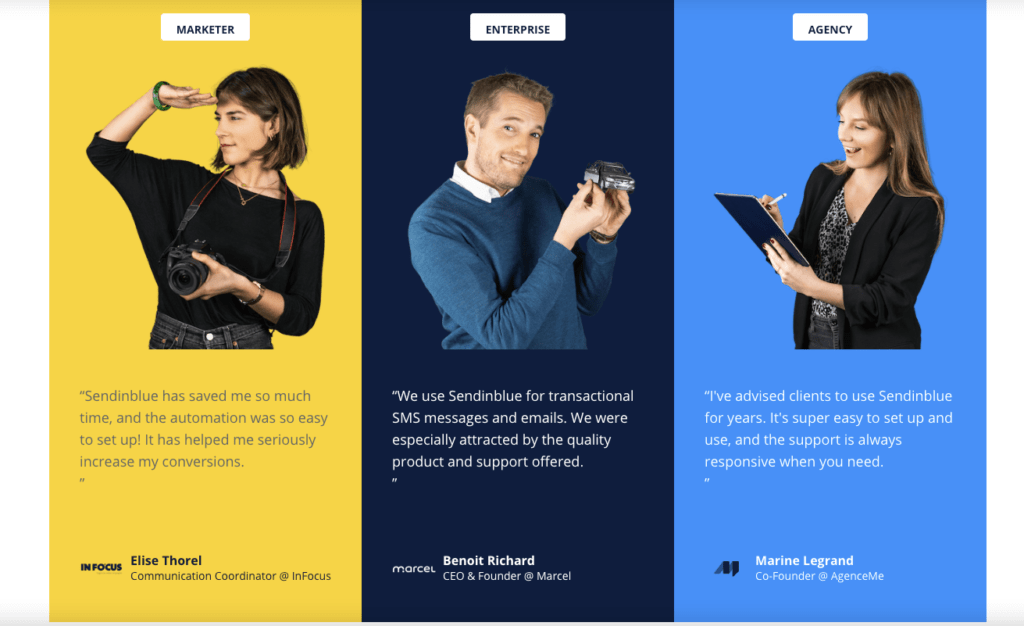
Sendinblue has its pros and cons. Here are some of the advantages and disadvantages of using Sendinblue for your AI email marketing tools and automation needs:
Pros:
- All-in-One Solution: Sendinblue offers a comprehensive suite of features, including email campaign management, marketing automation, contact management, SMS marketing, and transactional emails, all in one platform. This means businesses can manage their entire email marketing workflow in a single tool, saving time and effort.
- Ease of Use: Sendinblue’s platform is known for its user-friendly interface, making it easy for businesses, regardless of their size or technical expertise, to create, send, and track email campaigns. The drag-and-drop email editor, automation workflows, and contact management features are designed to be intuitive and easy to navigate.
- Advanced Automation: Sendinblue provides powerful marketing automation capabilities, allowing businesses to create complex workflows based on user behavior, segmentation, and triggers. This enables businesses to deliver targeted and personalized emails to their subscribers at the right time, improving engagement and conversion rates.
- High Deliverability: Sendinblue uses advanced technology and infrastructure to ensure high email deliverability rates. Its AI-powered algorithms optimize campaigns for maximum deliverability, helping businesses to reach their subscribers’ inboxes and avoid spam folders.
- Affordability: Sendinblue offers competitive pricing plans, making it accessible for businesses of all sizes. Its free plan allows businesses to start with basic features, and its paid plans offer more advanced features at reasonable pricing tiers, making it a cost-effective solution for email marketing automation.
Cons:
- Limited Customization: While Sendinblue’s email editor is easy to use, it may have limitations in terms of customization options compared to other platforms. Users may find it challenging to create highly custom email templates or make advanced design changes.
- Learning Curve for Advanced Features: While Sendinblue’s basic features are user-friendly, some of its more advanced features, such as marketing automation and segmentation, may require a learning curve for users who are new to marketing automation or have limited technical expertise.
- SMS Marketing Limited to Certain Countries: Sendinblue’s SMS marketing feature is currently available only for certain countries. Users in regions where SMS marketing is not supported may not be able to take advantage of this feature.
- Customer Support: While Sendinblue offers customer support, some users may find the response times or support options to be limited compared to other platforms. Users with complex technical issues may require additional support or customization, which may not be available in all plans.
- Limited Integrations: Although Sendinblue offers integrations with popular tools such as WordPress, WooCommerce, and Shopify, its integration options may be limited compared to other marketing automation platforms. Users with specific integration needs may need to explore workarounds or consider other platforms with more extensive integration options.
Sendinblue is a powerful and user-friendly marketing automation platform with a wide range of features that can benefit businesses of all sizes. However, users should also consider the limitations and their specific needs before choosing Sendinblue as their email marketing and automation solution. Conducting thorough research and evaluating different options based on your business requirements will help you make an informed decision.
When it comes to pricing, Sendinblue offers a variety of plans to suit different business needs and budgets. Here’s a breakdown of Sendinblue’s pricing options:
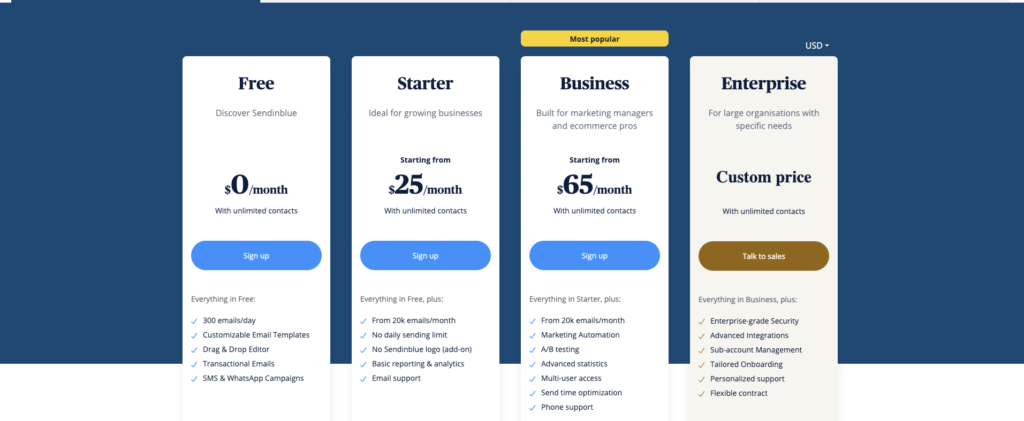
- Free Plan: Sendinblue offers a free plan that allows businesses to send up to 300 emails per day to unlimited subscribers. This plan includes basic features such as email campaign management, marketing automation, and contact management.
- Starter Plan: Sendinblue’s Lite plan starts at $25 per month and allows businesses to send up to 20,000 emails per month to unlimited subscribers. This plan includes additional features such as advanced email statistics, A/B testing, and remove Sendinblue logo from emails.
- Business Plan: Sendinblue’s Essential plan starts at $65 per month and allows businesses to send up to 20,000 emails per month to unlimited subscribers. This plan includes all the features of the Lite plan, as well as additional features such as advanced segmentation, landing page builder, and multi-user access.
- Enterprise Plan: Sendinblue’s Enterprise plan is a custom-priced plan that is tailored for large businesses with high email volume and advanced needs. This plan includes all the features of the Premium plan, as well as dedicated IP, custom onboarding, and dedicated account manager.
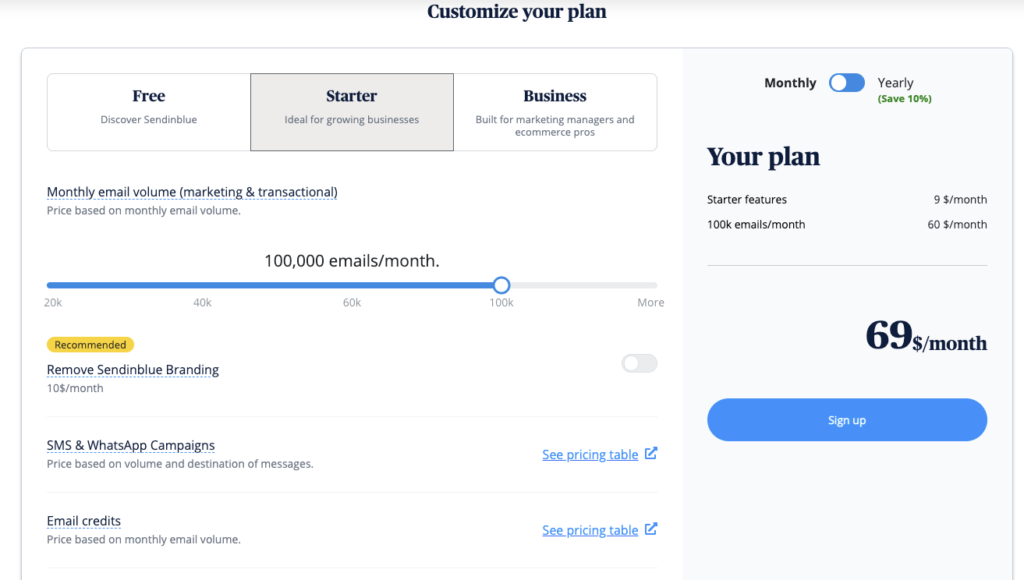
It’s important to note that pricing may vary depending on the size of your subscriber list and the specific features you need. Sendinblue also offers additional add-ons such as SMS credits, additional users, and custom templates, which may incur additional costs.
Overall, Sendinblue offers competitive pricing options with flexible plans that cater to businesses of all sizes, from startups to enterprise-level organizations. Businesses can choose a plan that best fits their needs and budget, and upgrade or downgrade as their requirements change over time.
#5 HubSpot – Ai email marketing tools: Marketing Software That’s Easy to Use and Love

HubSpot is a leading customer relationship management (CRM) and marketing automation platform that has gained widespread popularity among businesses of all sizes. In this article, we will provide a detailed introduction to the HubSpot platform, covering its history, technology, achievements, and key features.
History of HubSpot
HubSpot was founded in 2006 by Brian Halligan and Dharmesh Shah, with the aim of helping businesses attract, engage, and delight customers with inbound marketing. The company started as a small start-up in Cambridge, Massachusetts, and has since grown into a global leader in the CRM and marketing automation space.
Over the years, HubSpot has been recognized for its innovative approach to marketing and sales, and has received numerous awards for its technology, leadership, and impact on the industry. HubSpot’s mission is to provide businesses with the tools and resources they need to grow better, and it continues to evolve and expand its offerings to meet the changing needs of modern businesses.
Technology Behind HubSpot
HubSpot’s technology is built on a cloud-based, SaaS (Software-as-a-Service) platform that enables businesses to manage their marketing, sales, and customer service efforts in one central hub. The platform is designed to be user-friendly and scalable, making it accessible to businesses of all sizes, from small startups to large enterprises.
HubSpot’s platform is powered by a suite of integrated tools and features that help businesses attract, engage, and convert leads into customers. These tools include AI email marketing tools, social media management, content creation and management, lead generation, CRM, sales automation, analytics, and more. The platform also integrates with popular third-party apps and services, allowing businesses to streamline their workflows and optimize their marketing and sales processes.
One of HubSpot’s key technological innovations is its inbound marketing methodology, which focuses on attracting and engaging customers through valuable content, personalized experiences, and targeted messaging. This approach has gained widespread adoption in the marketing industry, and HubSpot has been at the forefront of driving this shift in marketing strategy.
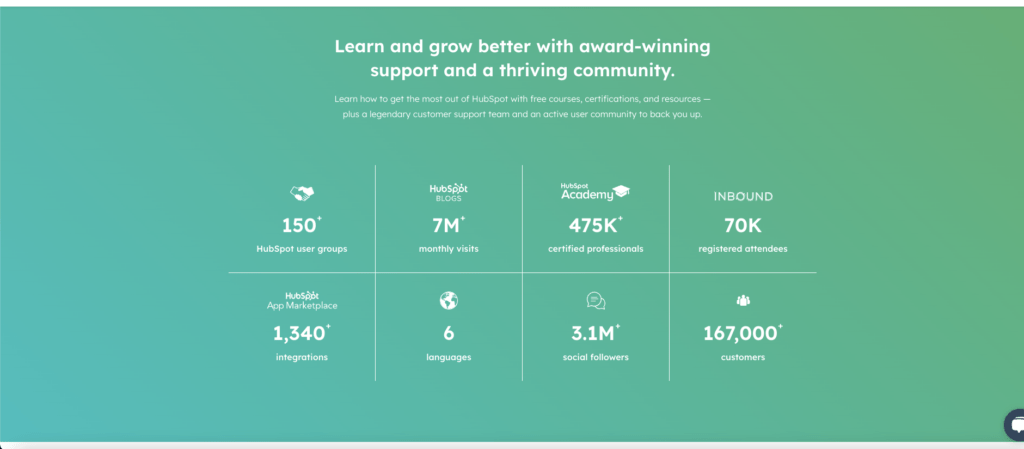
Achievements of HubSpot
Since its inception, HubSpot has achieved significant milestones and accolades, positioning itself as a leader in the CRM and marketing automation space. Some of HubSpot’s notable achievements include:
- Going public in 2014, becoming the first inbound marketing company to be listed on the New York Stock Exchange (NYSE).
- Expanding its global presence with offices in multiple countries, serving customers in over 100 countries worldwide.
- Acquiring several companies to expand its product offerings and capabilities, including acquisitions in the areas of sales automation, customer service, content management, and more.
- Garnering numerous industry awards for its technology, innovation, and impact on the marketing and sales industry, including recognition from Gartner, Forbes, Inc., and others.
- Building a strong and vibrant community of customers, partners, and marketers who share best practices, insights, and success stories through HubSpot’s online community, INBOUND conference, and other events.

Key Features of HubSpot:
HubSpot offers a wide range of features and tools that help businesses optimize their marketing, sales, and customer service efforts. Some of the key features of HubSpot’s platform include:
- CRM: HubSpot’s CRM is the foundation of its platform, providing businesses with a comprehensive view of their contacts, leads, and customers, and enabling them to manage their sales and marketing efforts in one place. The CRM includes features such as contact and lead management, deal tracking, email tracking, task automation, and more.
- Marketing Automation: HubSpot’s marketing automation tools enable businesses to create, manage, and optimize their marketing campaigns, from email marketing and social media management to content creation and lead generation. These tools include features such
- Sales Automation: HubSpot’s sales automation tools are designed to streamline the sales process and enable sales teams to manage their leads, deals, and communication more efficiently. These tools include features such as email templates, sales sequences, contact and lead tracking, meeting scheduling, document management, and more. HubSpot’s sales automation features help businesses close deals faster and improve their sales productivity.
- Customer Service: HubSpot’s customer service tools help businesses provide excellent customer support and manage customer inquiries and issues effectively. These tools include features such as ticketing, live chat, knowledge base, customer feedback, customer surveys, and more. HubSpot’s customer service features enable businesses to deliver exceptional customer experiences and build customer loyalty.
- Content Management: HubSpot’s content management tools help businesses create, manage, and optimize their content, including website pages, blogs, landing pages, and more. These tools include features such as content creation, content optimization, content scheduling, content performance tracking, and more. HubSpot’s content management features enable businesses to create engaging and relevant content that resonates with their target audience.
- Analytics and Reporting: HubSpot’s analytics and reporting tools provide businesses with insights and data to measure and optimize their marketing, sales, and customer service efforts. These tools include features such as performance tracking, campaign analytics, ROI tracking, sales analytics, customer feedback tracking, and more. HubSpot’s analytics and reporting features enable businesses to make data-driven decisions and continuously improve their strategies.
- Integration and Customization: HubSpot’s platform integrates with a wide range of third-party apps and services, allowing businesses to customize their workflows and tailor their marketing and sales processes according to their unique requirements. HubSpot also provides customization options within its platform, such as custom fields, custom reporting, custom dashboards, and more. HubSpot’s integration and customization features enable businesses to create a seamless and personalized experience for their customers.
HubSpot is a leading CRM and marketing automation platform that offers a comprehensive suite of tools and features to help businesses optimize their marketing, sales, and customer service efforts. With its innovative technology, notable achievements, and key features such as CRM, marketing automation, sales automation, customer service, content management, analytics, and customization, HubSpot has become a popular choice for businesses seeking an all-in-one platform to grow their customer relationships and drive business success.
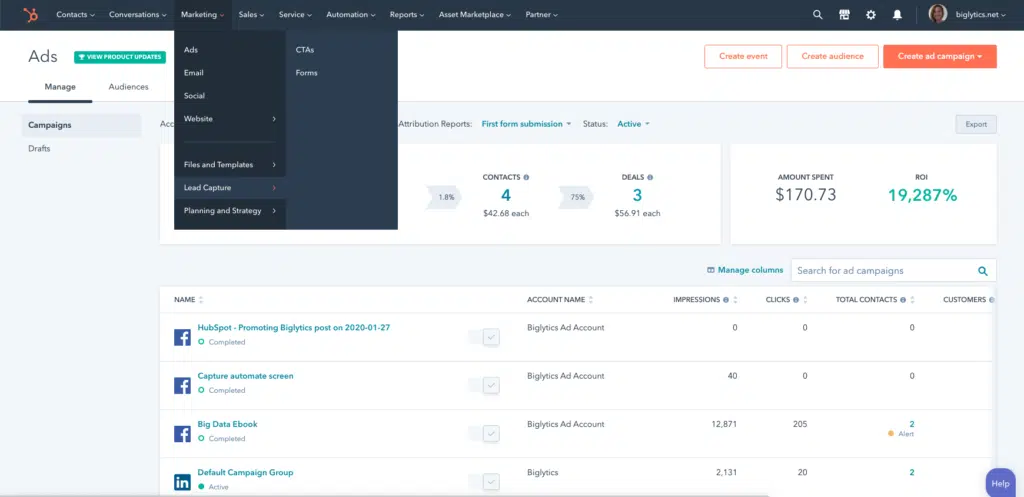
As a proficient SEO and high-end copywriter, I would like to provide you with an unbiased review of HubSpot, outlining both its strengths (likes) and weaknesses (dislikes) as a CRM and marketing automation platform.
Likes:
- Comprehensive Suite of Tools: HubSpot offers a wide range of tools and features, including CRM, marketing automation, sales automation, customer service, content management, analytics, and customization. This all-in-one platform allows businesses to streamline their marketing, sales, and customer service efforts, and provides a holistic view of their customer interactions.
- User-Friendly Interface: HubSpot has a user-friendly interface that makes it easy for businesses to navigate and use the platform. The dashboard provides a clear overview of key metrics, and the tools are designed to be intuitive and easy to use, even for users with limited technical skills.
- Robust CRM Functionality: HubSpot’s CRM offers robust functionality, including contact and lead management, deal tracking, task management, email tracking, and more. It provides businesses with a central hub to manage their customer relationships and sales pipeline effectively.
- Powerful Marketing Automation: HubSpot’s marketing automation features allow businesses to create, automate, and optimize marketing campaigns across various channels, such as email, social media, and content marketing. The platform offers advanced segmentation, personalization, and workflow automation capabilities, helping businesses to nurture leads and convert them into customers.
- Integration and Customization: HubSpot integrates with a wide range of third-party apps and services, allowing businesses to connect their existing tools and systems with HubSpot. The platform also offers customization options, such as custom fields, custom reporting, and custom dashboards, enabling businesses to tailor their workflows and processes according to their unique requirements.
Dislikes:
- Cost: HubSpot’s pricing can be relatively high, especially for small businesses or startups on a tight budget. The platform offers various pricing tiers, and some of the advanced features are only available in the higher-priced plans, which may not be affordable for all businesses.
- Steep Learning Curve: While HubSpot’s interface is user-friendly, mastering all the features and functionalities of the platform can require a significant learning curve. Businesses may need to invest time and resources in training their team members to effectively use HubSpot’s tools and get the most out of the platform.
- Limited Reporting and Analytics: While HubSpot offers basic reporting and analytics features, some users may find them limited in terms of customization and depth of insights. Businesses may need to rely on additional analytics tools or manual data analysis to get a more comprehensive view of their marketing and sales performance.
- Complexity for Large Enterprises: While HubSpot is suitable for small and medium-sized businesses, some large enterprises may find the platform lacking in terms of scalability and advanced functionality. Larger organizations may require more advanced features, customization options, and integrations that may not be fully available in HubSpot.
In conclusion, HubSpot offers a comprehensive suite of CRM and marketing automation tools with a user-friendly interface, robust functionality, and integration options. However, the platform’s pricing, learning curve, limited reporting, and complexity for large enterprises may be potential dislikes for some users. Overall, HubSpot can be a valuable platform for businesses looking to optimize their marketing, sales, and customer service efforts, but careful consideration of their specific needs and budget is necessary.
HubSpot offers a range of pricing plans to cater to different business needs.
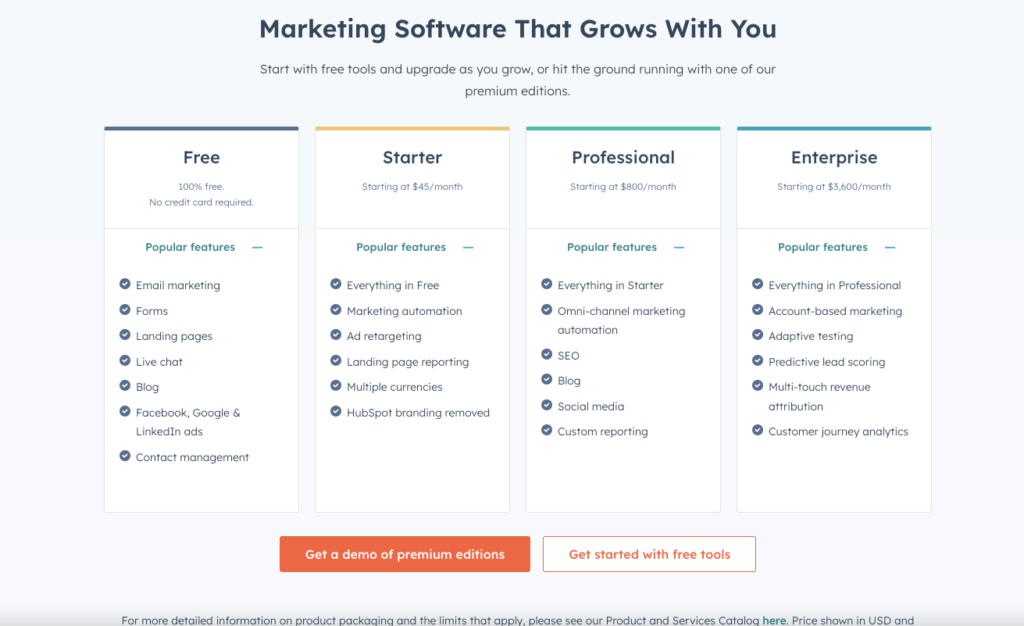
- Free CRM: HubSpot offers a free CRM plan with basic CRM functionality, including contact management, deal tracking, task management, email tracking, and more. This plan is suitable for small businesses or startups with basic CRM requirements.
- Marketing Hub: HubSpot’s Marketing Hub offers three pricing tiers – Starter, Professional, and Enterprise. The pricing varies based on the features and capabilities offered in each plan, such as email marketing, social media, content creation, marketing automation, reporting, and more. The Marketing Hub plans are designed for businesses looking to automate their marketing efforts and scale their marketing operations.
- Free and premium plans that grow with you. Editions starting at:
– $0/month (Free)
– $45/month (Starter)
– $800/month (Professional)
– $3,600/month (Enterprise)
- Free and premium plans that grow with you. Editions starting at:
- Sales Hub: HubSpot’s Sales Hub also offers three pricing tiers – Starter, Professional, and Enterprise. These plans are tailored for businesses looking to streamline their sales processes, manage leads and deals, track communications, and automate sales activities.
- Service Hub: HubSpot’s Service Hub also offers three pricing tiers – Starter, Professional, and Enterprise. These plans are designed for businesses focused on customer service and support, offering features such as ticketing, live chat, knowledge base, automation, reporting, and more.
- CMS Hub: HubSpot’s CMS Hub offers two pricing tiers – Professional and Enterprise. These plans are designed for businesses looking for a content management system (CMS) with advanced features such as website design, blogging, SEO, and more.
- Please note that HubSpot’s pricing may change over time, and it’s always best to visit their official website or contact their sales team for the most up-to-date and accurate pricing information tailored to your specific business requirements.
#6 AWeber : Connect, automate, and sell your vision to the world
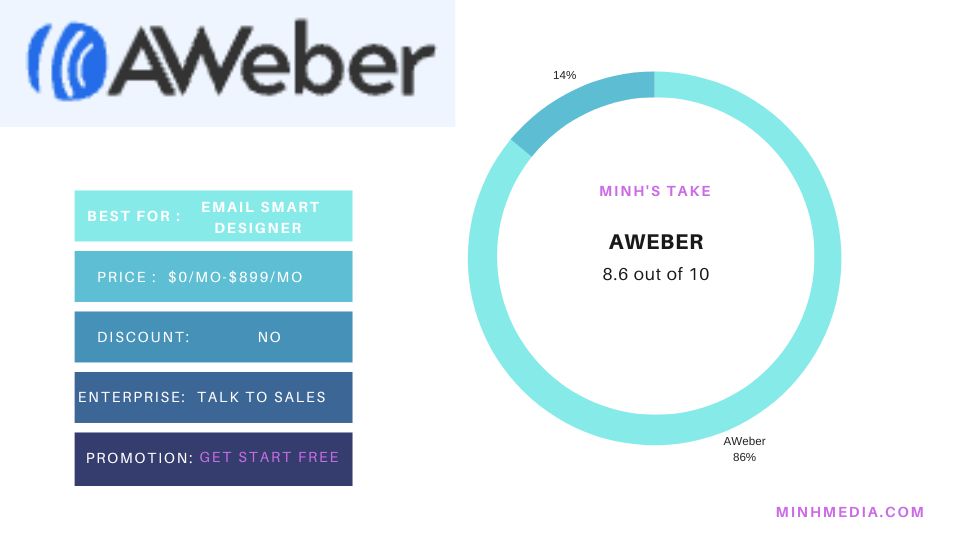
AWeber is a popular AI email marketing tools that has been serving businesses for over 20 years. It has a rich history, innovative technology, impressive achievements, and a wide range of features that make it a powerful tool for businesses looking to grow their email marketing efforts. In this article, we will provide a detailed introduction to the AWeber platform, covering its history, technology, achievements, and features.
History: AWeber was founded in 1998 by Tom Kulzer with a vision to help businesses effectively manage their email marketing campaigns. Over the years, AWeber has grown into a leading email marketing platform, serving millions of customers worldwide. With a strong focus on customer success and innovation, AWeber has continuously evolved its platform to meet the changing needs of businesses in the digital marketing landscape.
Technology: AWeber boasts advanced technology that enables businesses to create, send, and track effective email marketing campaigns. Its user-friendly interface and robust automation capabilities make it easy for businesses to automate their AI email marketing tools efforts and reach their target audience at the right time with personalized messages. AWeber’s technology also includes powerful email analytics and reporting features that provide insights into campaign performance, subscriber engagement, and more, allowing businesses to optimize their email marketing strategies for better results.
Achievements: AWeber has achieved numerous milestones throughout its history, earning recognition for its innovative solutions and outstanding customer support. Some of its notable achievements include:
- Industry Awards: AWeber has won several industry awards for its excellence in AI email marketing tools, including the prestigious Stevie Awards, which recognize outstanding business achievements.
- Trusted by Millions: AWeber has been trusted by millions of businesses worldwide, ranging from small startups to large enterprises, for their email marketing needs. Its reputation for reliability and effectiveness has earned it a loyal customer base.
- Customer Success Stories: AWeber has helped numerous businesses achieve success with their email marketing campaigns. Many businesses have shared their success stories on how AWeber has helped them grow their email list, increase their open rates, and boost their overall marketing performance.
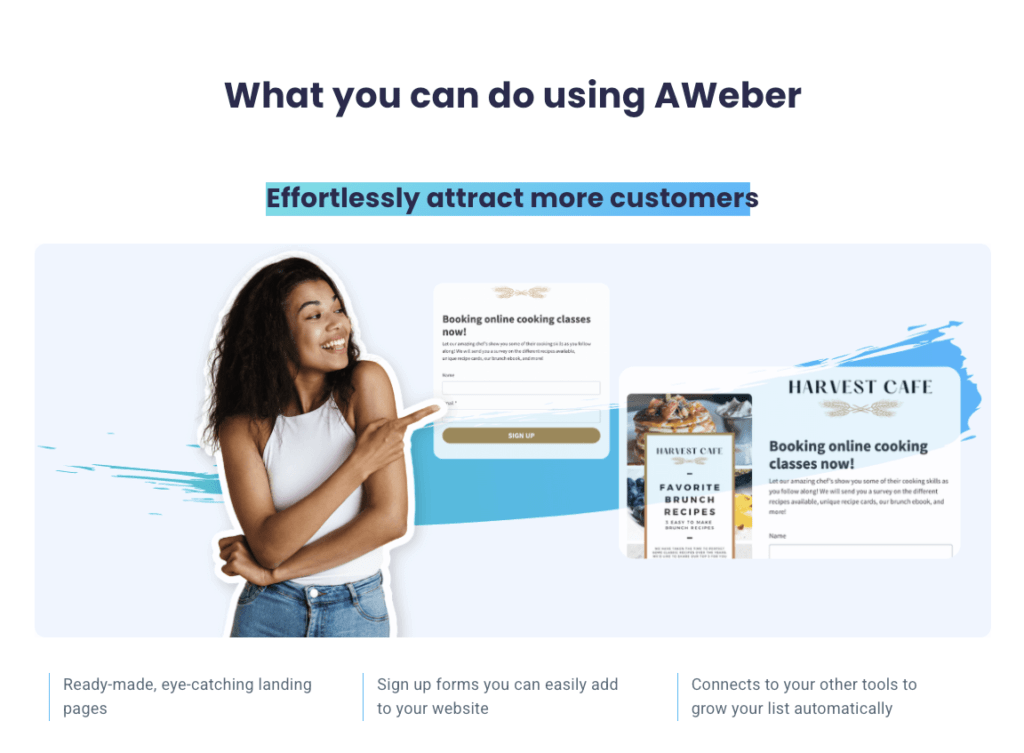
Key Features:
AWeber offers a wide range of features that empower businesses to create and execute successful email marketing campaigns. Some of the key features of AWeber platform include:
- Email Automation: AWeber offers powerful automation capabilities that enable businesses to create automated email campaigns based on triggers, actions, and conditions. This helps businesses save time, personalize messages, and engage with subscribers in a targeted manner.
- Drag-and-Drop Email Editor: AWeber’s intuitive email editor allows businesses to create professional-looking emails without any coding skills. The drag-and-drop interface makes it easy to design emails, add images, text, buttons, and more, and preview how the emails will look on different devices.
- Email Analytics and Reporting: AWeber provides in-depth analytics and reporting features that allow businesses to track the performance of their email campaigns, including open rates, click-through rates, conversion rates, and more. This data helps businesses make data-driven decisions and optimize their email marketing strategies for better results.
- List Segmentation: AWeber allows businesses to segment their email list based on various criteria, such as subscriber behavior, demographics, and preferences. This helps businesses send targeted emails to specific segments of their audience, increasing the relevance and effectiveness of their email campaigns.
- Landing Page Builder: AWeber offers a landing page builder that enables businesses to create custom landing pages without any coding skills. This helps businesses drive traffic to dedicated landing pages and capture leads effectively.
- Integrations: AWeber integrates with a wide range of third-party tools and platforms, including popular CRMs, e-commerce platforms, social media, and more, allowing businesses to streamline their email marketing efforts and
Expand their marketing capabilities.
- Responsive Email Templates: AWeber provides a library of responsive email templates that are designed to look great on all devices, including desktops, laptops, tablets, and mobile devices. These templates can be easily customized to match a business’s brand identity and messaging.
- Subscriber Management: AWeber offers robust subscriber management features that allow businesses to easily import, export, and manage their email subscribers. Businesses can also set up automated list management rules, such as automatically unsubscribing inactive subscribers or segmenting subscribers based on their interactions.
- Customer Support: AWeber is known for its exceptional customer support, offering various channels for assistance, including live chat, email, and phone support. They also provide extensive documentation, tutorials, and webinars to help businesses get the most out of their platform.
Likes:
- AWeber’s easy-to-use interface and drag-and-drop email editor make it simple for businesses to create professional-looking emails without any coding skills.
- The platform’s powerful automation capabilities allow businesses to save time and create personalized, targeted email campaigns based on triggers, actions, and conditions.
- AWeber’s extensive analytics and reporting features provide valuable insights into campaign performance, helping businesses optimize their email marketing strategies for better results.
- The platform’s integrations with third-party tools and platforms enable businesses to streamline their marketing efforts and expand their capabilities.
- AWeber’s exceptional customer support, including live chat, email, and phone support, is highly regarded by its users.
Dislikes:
- Some users may find AWeber’s pricing to be higher compared to other AI email marketing tools in the market.
- The platform may not offer as advanced features as some of the more enterprise-focused email marketing platforms, which could be a drawback for businesses with complex marketing needs.
In conclusion, AWeber is a well-established AI email marketing tools with a rich history, innovative technology, and impressive achievements. Its features, including email automation, drag-and-drop email editor, analytics, and integrations, make it a powerful tool for businesses looking to grow their email marketing efforts. However, its pricing and feature limitations may not be suitable for all businesses. It’s recommended to evaluate AWeber’s offerings based on the specific needs and budget of your business to determine if it’s the right fit for your email marketing requirements.
Here’s an overview of AWeber’s pricing plans for their email marketing services:
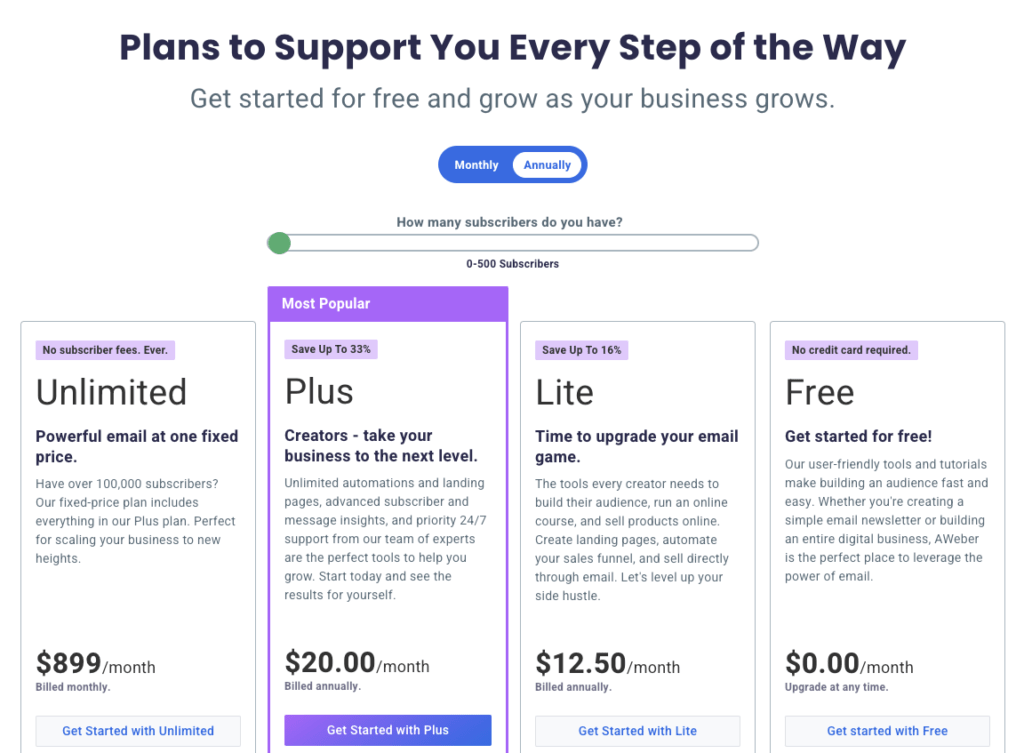
- Free Plan: AWeber offers a free plan with limited features that allows businesses to send emails to up to 500 subscribers. This plan includes basic email automation, a landing page builder, and subscriber segmentation.
- Lite Plan: AWeber’s Pro Plan starts at $12.50 per month for to unlimited subscribers. businesses get access to unlimited emails, advanced email automation, A/B testing, analytics and reporting, integrations with CRM and e-commerce platforms, and priority customer support. The pricing for the Pro Plan increases as the subscriber count grows.
- Plus Plan: AWeber’s Pro Plan starts at $20 per month for to unlimited subscribers. businesses get access to unlimited emails, advanced email automation, A/B testing, analytics and reporting, integrations with CRM and e-commerce platforms, and priority customer support. Advanced landing page features.S ales tracking and low transaction fees. Remove AWeber branding
- Unlimited Plan: AWeber’s Pro Plan starts at $899 per month For businesses with high-volume email marketing needs, AWeber offers custom pricing based on the number of subscribers and email volume. This plan is suitable for businesses that require advanced features, dedicated IP addresses, and personalized onboarding and support.
It’s important to note that pricing and plans may vary, and it’s always best to visit AWeber’s official website or contact their sales team for the most up-to-date and accurate pricing information. Additionally, AWeber offers a 14-day free trial for their Pro Plan, allowing businesses to try out the full range of features before committing to a paid plan. AWeber also offers discounts for annual billing and special pricing for non-profit organizations.
Investing in an AI email marketing tools like AWeber can be a valuable tool for businesses to grow their customer base, engage with their audience, and drive revenue through effective email campaigns. Carefully evaluating the features, benefits, and pricing of AWeber’s plans can help businesses determine which plan best fits their needs and budget.
#7 GetResponse: Email marketing solutions for what you need to do
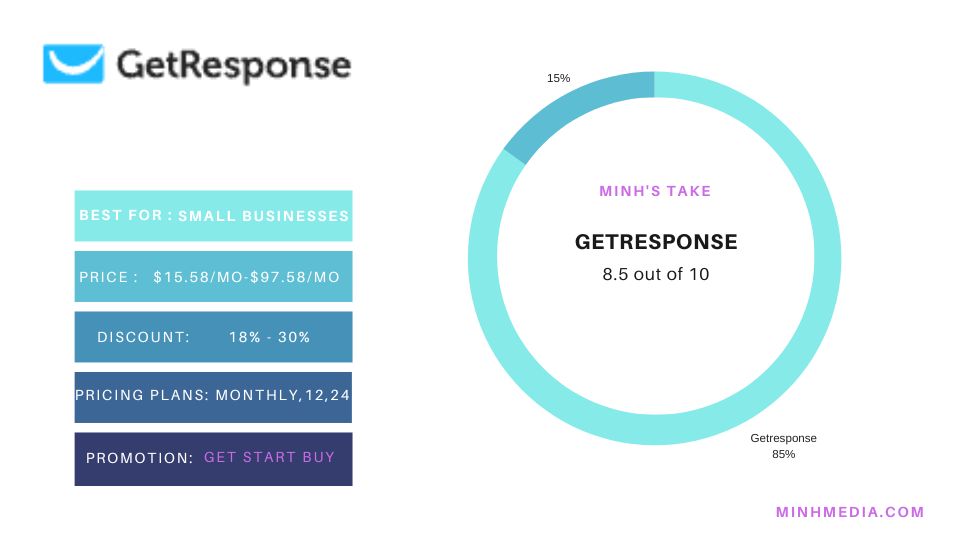
Introduction to the GetResponse platform, including its history, technology, achievements, and features:
History: GetResponse is AI email marketing tools and marketing automation platform that was founded in 1999 by Simon Grabowski. Over the years, it has evolved into a comprehensive marketing solution, offering a wide range of features and tools to help businesses create, manage, and optimize their email marketing campaigns.
Technology: GetResponse utilizes advanced technology to deliver a robust and reliable AI email marketing tools . It has a user-friendly interface that allows businesses to easily create and send professional-looking emails to their subscribers. The platform also offers a drag-and-drop email editor, making it simple to create engaging emails without any coding skills. Additionally, GetResponse uses high deliverability servers and follows best practices to ensure that emails are delivered to the inbox of the intended recipients.
Achievements: GetResponse has received recognition for its achievements in the email marketing industry. Some of its notable achievements include being awarded the Gold Stevie Award for the Best Marketing Automation Solution in the International Business Awards in 2020, as well as being named the Best Email Marketing Service by PCMag Readers’ Choice Awards in 2020 and 2021. GetResponse has also received positive reviews from users for its ease of use, features, and customer support.
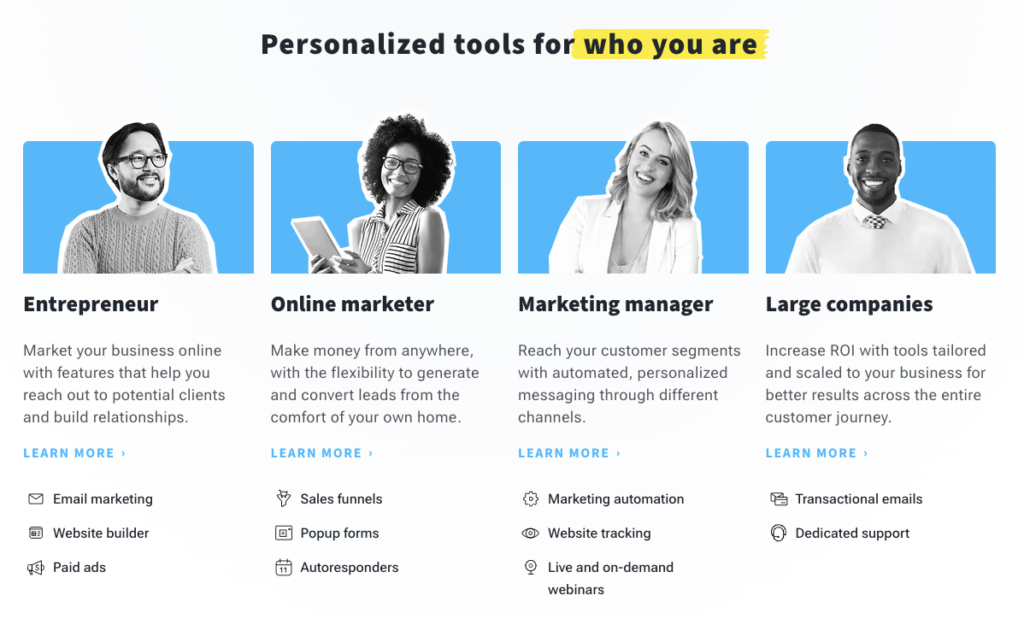
Key Features:
GetResponse offers a wide range of features to help businesses create and manage effective email marketing campaigns. Some of the key features include:
- Email Campaigns: GetResponse provides a user-friendly email editor that allows businesses to create professional-looking emails with customizable templates, drag-and-drop editing, and the ability to add images, videos, and other multimedia elements.
- Marketing Automation: GetResponse offers robust marketing automation features, allowing businesses to automate their email campaigns based on triggers, actions, and conditions. This includes personalized workflows, autoresponders, and behavioral tracking to deliver targeted and relevant content to subscribers.
- Landing Pages: GetResponse includes a landing page builder that enables businesses to create customizable landing pages without any coding skills. These landing pages can be used for lead generation, sales, and other marketing campaigns.
- Webinars: GetResponse has a built-in webinar platform that allows businesses to host live or automated webinars to engage with their audience and generate leads.
- CRM Integration: GetResponse integrates with popular CRM (Customer Relationship Management) platforms, allowing businesses to manage and track their leads and customers seamlessly.
- Analytics and Reporting: GetResponse provides in-depth analytics and reporting features, including email open rates, click-through rates, conversions, and more, to help businesses measure the success of their email campaigns and make data-driven decisions.
- List Management: GetResponse offers advanced list management features, including segmenting subscribers based on various criteria, managing bounce and unsubscribe rates, and cleaning up inactive subscribers to maintain a healthy and engaged email list.
In addition to these features, GetResponse also offers 24/7 customer support, a mobile app for managing campaigns on the go, integrations with popular e-commerce platforms and social media networks, and a library of educational resources, tutorials, and webinars to help businesses make the most of the platform.
In conclusion, GetResponse is a comprehensive email marketing and marketing automation platform with a rich history, advanced technology, notable achievements, and a wide range of features to help businesses create, manage, and optimize their email marketing campaigns. Whether you’re a small business owner, marketer, or entrepreneur, GetResponse can be a valuable tool to drive engagement, conversions, and revenue through effective email marketing strategies.
Here are some likes and dislikes about GetResponse:
Likes:
- Feature-rich platform: GetResponse offers a wide range of features for AI email marketing tools and marketing automation, including email templates, customization options, analytics, landing pages, and more, making it a comprehensive solution for businesses.
- Integration capabilities: GetResponse integrates with popular e-commerce platforms, CRM systems, social media networks, and other tools, allowing for seamless integration with existing business systems and workflows.
- Mobile app accessibility: GetResponse offers a mobile app for iOS and Android devices, providing convenience and flexibility for users to manage their email campaigns on the go.
- GDPR compliance: GetResponse is compliant with the General Data Protection Regulation (GDPR), ensuring that businesses can use the platform to send emails to subscribers in the EU while adhering to data protection requirements.
- 24/7 customer support: GetResponse provides 24/7 customer support via email, live chat, and phone, which is known for being responsive and helpful in resolving issues or questions.
Dislikes:
- Pricing: Some users may find GetResponse’s pricing to be on the higher side compared to other email marketing platforms, especially as the number of subscribers grows.
- Learning curve: While GetResponse offers a user-friendly interface, some users may still require time and effort to fully understand and utilize all the features and functionalities of the platform.
- Limited free trial: GetResponse offers a 30-day free trial, which may be shorter compared to other email marketing platforms that offer longer trial periods.
- Template limitations: While GetResponse provides a wide range of email templates, some users may find the customization options to be limited, requiring additional coding skills for more advanced customization.
- Reporting limitations: Some users may find the reporting and analytics capabilities of GetResponse to be basic compared to more advanced email marketing platforms, which may require additional tools for in-depth analysis.
It’s important to note that likes and dislikes can vary depending on individual preferences and business requirements. It’s recommended to thoroughly evaluate the features, pricing, and suitability of GetResponse for your specific needs before making a decision.
Here’s some additional information about Pricing services of GetResponse:
Pricing: GetResponse offers different pricing plans to cater to various business needs. The plans are based on the number of subscribers, and there are options for monthly billing or annual billing with discounts. GetResponse also offers a 30-day free trial, allowing users to explore the platform and its features before committing to a paid plan.

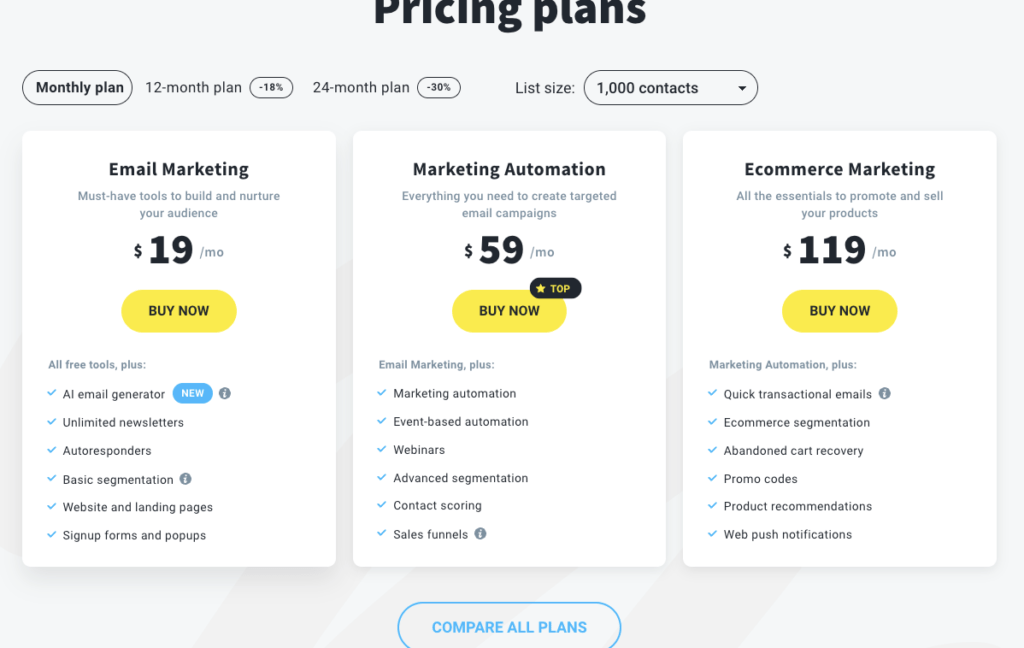
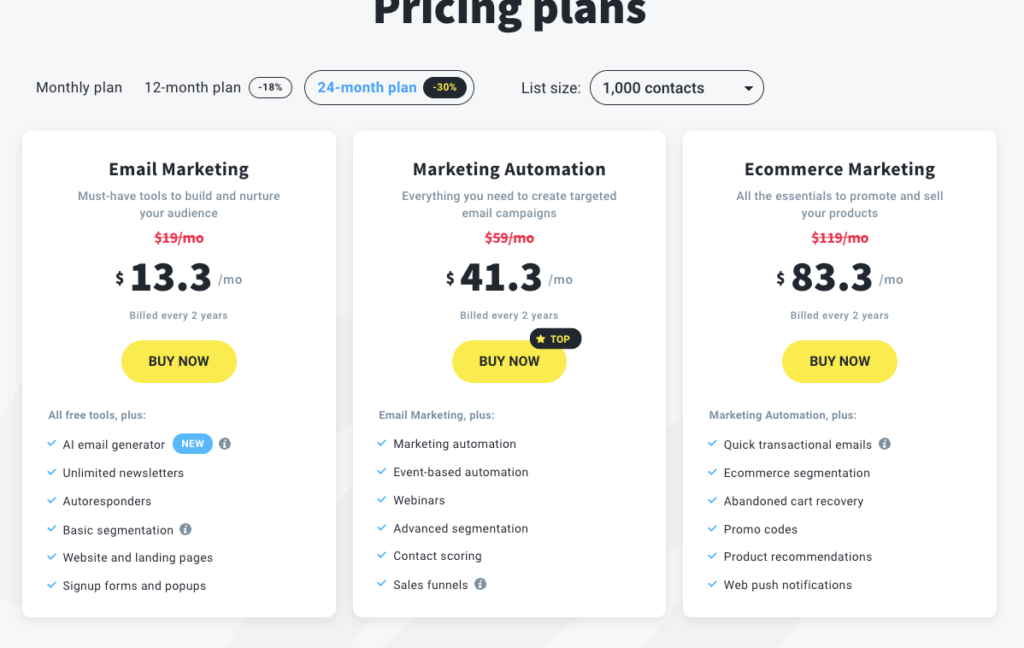
Customer Support: GetResponse provides 24/7 customer support via email, live chat, and phone. They also offer a knowledge base, tutorials, and webinars to help users get started and make the most of the platform. The customer support is known for being responsive and helpful in resolving any issues or questions.
Integrations: GetResponse integrates with popular e-commerce platforms, CRM systems, content management systems (CMS), social media networks, and other third-party tools. This allows businesses to seamlessly connect their email marketing campaigns with their existing tools and systems for a streamlined workflow.
Mobile App: GetResponse offers a mobile app for iOS and Android devices, allowing users to manage their email campaigns, check analytics, and access other features on the go. The app provides flexibility and convenience for users who prefer to manage their email marketing campaigns from their mobile devices.
Templates and Customization: GetResponse provides a wide range of email templates and a drag-and-drop email editor, making it easy to create visually appealing emails without any coding skills. The platform also offers customization options, including adding images, videos, buttons, and other elements, to create personalized and engaging emails.
GDPR Compliance: GetResponse is compliant with the General Data Protection Regulation (GDPR), which is a set of data protection regulations in the European Union. This ensures that businesses can use the platform to send emails to subscribers in the EU while adhering to the data protection requirements.
In conclusion, GetResponse is a feature-rich AI email marketing tools and marketing automation platform with competitive pricing, reliable customer support, seamless integrations, mobile app accessibility, customizable templates, and GDPR compliance. It offers a comprehensive solution for businesses to create, manage, and optimize their email marketing campaigns with ease.
#8 Omnisend: Increase sales, not your workload
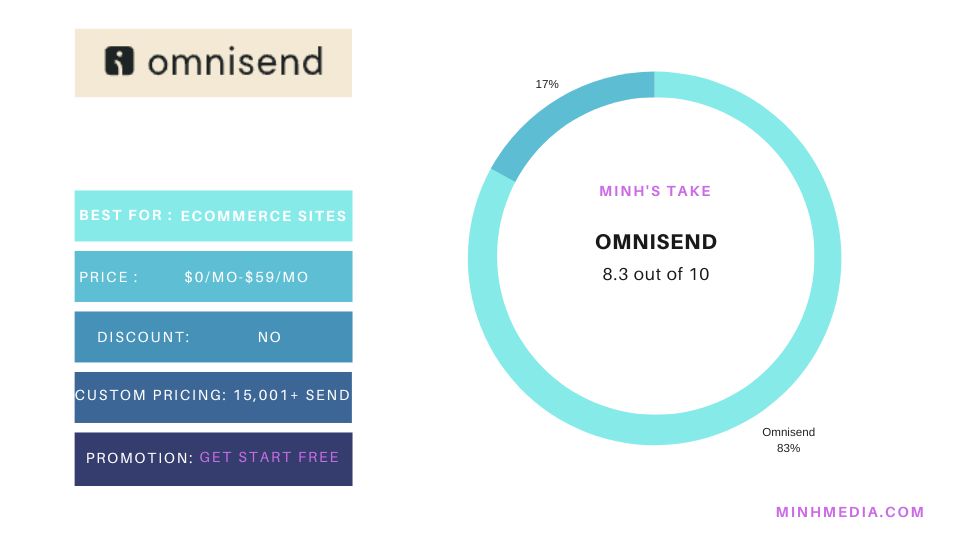
Join the 80,000+ ecommerce brands that grow with Omnisend every day
History: Omnisend is an email and SMS marketing automation platform that was founded in 2014 by Rytis Lauris and Justas Kriukas. The company is headquartered in London, United Kingdom, and has offices in the United States, Lithuania, and Ukraine. Omnisend was created with the goal of helping e-commerce businesses optimize their email and SMS marketing campaigns through automation, segmentation, and personalization.
Technology: Omnisend leverages advanced automation and segmentation technologies to help businesses automate their email and SMS marketing campaigns. The platform integrates with popular e-commerce platforms such as Shopify, Magento, WooCommerce, BigCommerce, and others, making it easy for businesses to synchronize their customer data and create targeted campaigns. Omnisend offers a visual automation builder, pre-built automation workflows, and advanced segmentation capabilities to create personalized and targeted messages based on customer behavior, preferences, and purchase history.

Achievements: Since its inception, Omnisend has achieved several notable milestones, including:
- Rapid growth: Omnisend has experienced significant growth since its founding, with thousands of e-commerce businesses around the world using the platform for their AI email marketing tools and SMS marketing needs.
- Industry recognition: Omnisend has received recognition in the industry, including being named a G2 Leader in the Email Marketing Automation category, and winning the Best Marketing Automation Platform award at the 2020 Martech Breakthrough Awards.
- High customer satisfaction: Omnisend has a strong track record of customer satisfaction, with positive reviews and testimonials from businesses that have found success in using the platform to optimize their email and SMS marketing campaigns.
Omnisend’s key features include:
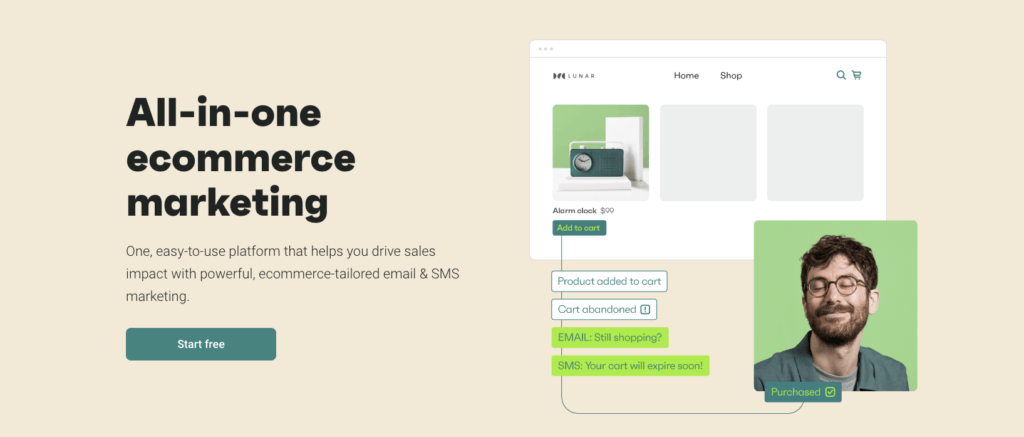
- Multi-Channel Marketing Automation: Omnisend provides a wide range of channels to communicate with your customers, including AI email marketing tools, SMS, push notifications, Facebook Messenger, WhatsApp, and more. This allows you to reach your audience across various platforms and devices.
- Segmentation and Personalization: Omnisend allows you to segment your audience based on their behavior and demographics, and use this information to create highly personalized campaigns. You can tailor your content, messaging, and offers to each individual customer, leading to higher engagement and conversions.
- Automation Workflows: With Omnisend, you can create powerful automation workflows that are triggered by specific events or actions, such as a new subscriber or a completed purchase. These workflows can be customized to suit your specific business needs, and can help streamline your marketing processes.
- Campaign Designer: Omnisend’s drag-and-drop campaign designer allows you to create stunning email and SMS campaigns without any coding skills. You can choose from a variety of templates, add your own images and text, and customize the design to match your brand.
- Ecommerce Integration: Omnisend integrates with a range of ecommerce platforms, including Shopify, WooCommerce, and Magento. This allows you to sync your store data with Omnisend, track customer behavior, and create targeted campaigns based on their purchase history.
- Analytics and Reporting: Omnisend provides detailed analytics and reporting features, allowing you to track the performance of your campaigns and optimize them for better results. You can view metrics such as open rates, click-through rates, revenue generated, and more.
Omnisend is a powerful AI email marketing tools for automation that offers a range of features to help businesses of all sizes connect with their customers and drive growth. Its multi-channel approach, segmentation and personalization capabilities, automation workflows, and analytics and reporting make it a popular choice for ecommerce businesses looking to improve their marketing efforts.
Here are some likes and dislikes about Omnisend as a marketing automation tool:
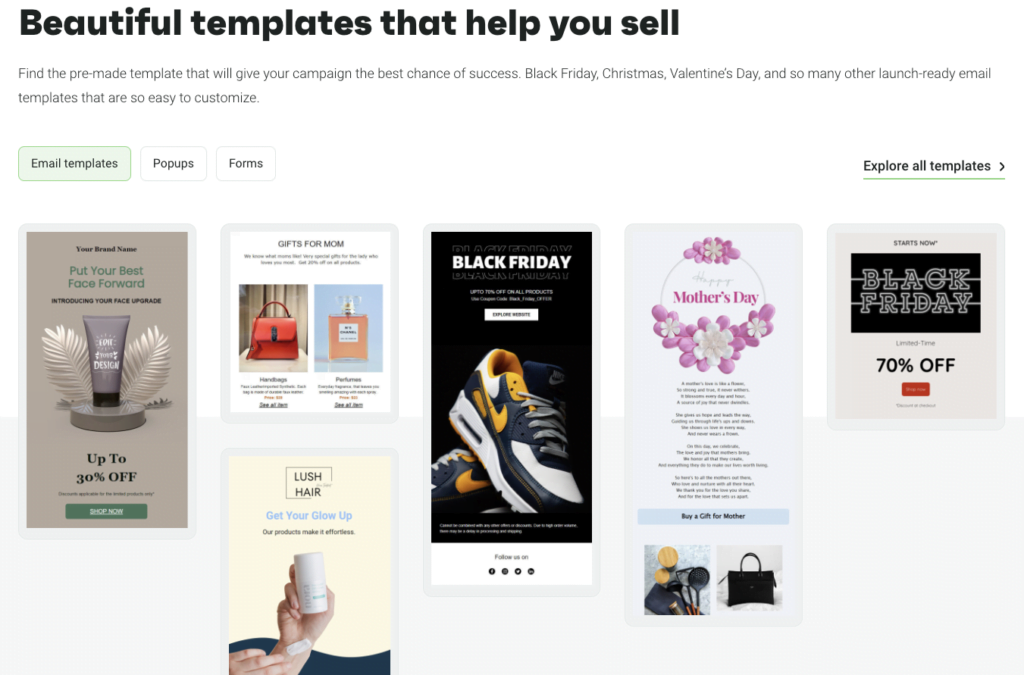
Likes:
- Multi-channel capabilities: Omnisend allows businesses to reach their customers through various channels like email, SMS, push notifications, Facebook Messenger, WhatsApp, and more, providing flexibility in communication.
- Segmentation and personalization: Omnisend’s segmentation and personalization features enable businesses to create highly targeted and relevant campaigns, leading to improved engagement and conversions.
- Automation workflows: Omnisend’s automation workflows make it easy to create automated campaigns triggered by specific events or actions, saving time and effort in manual marketing tasks.
- Ecommerce integration: Omnisend seamlessly integrates with popular ecommerce platforms, making it convenient for online businesses to sync their store data and create tailored campaigns based on customer behavior and purchase history.
- Campaign designer: Omnisend’s drag-and-drop campaign designer makes it simple to create visually appealing email and SMS campaigns without requiring coding skills, allowing businesses to create professional-looking campaigns.
Dislikes:
- Pricing: Some users may find Omnisend’s pricing plans to be relatively higher compared to other marketing automation tools, which may be a factor to consider for small businesses on a budget.
- Learning curve: While Omnisend’s user interface is generally intuitive, some users may require time to get accustomed to the platform’s features and functionalities.
- Limited integrations: While Omnisend integrates with popular ecommerce platforms, it may have limited integrations with other third-party tools or services, which could be a limitation for businesses with specific requirements.
- Support options: Some users may find Omnisend’s support options, such as live chat and phone support, to be limited compared to other marketing automation tools, which could impact their experience in case of any issues or questions.
Omnisend offers three main pricing plans: Free, Standard, and Pro.
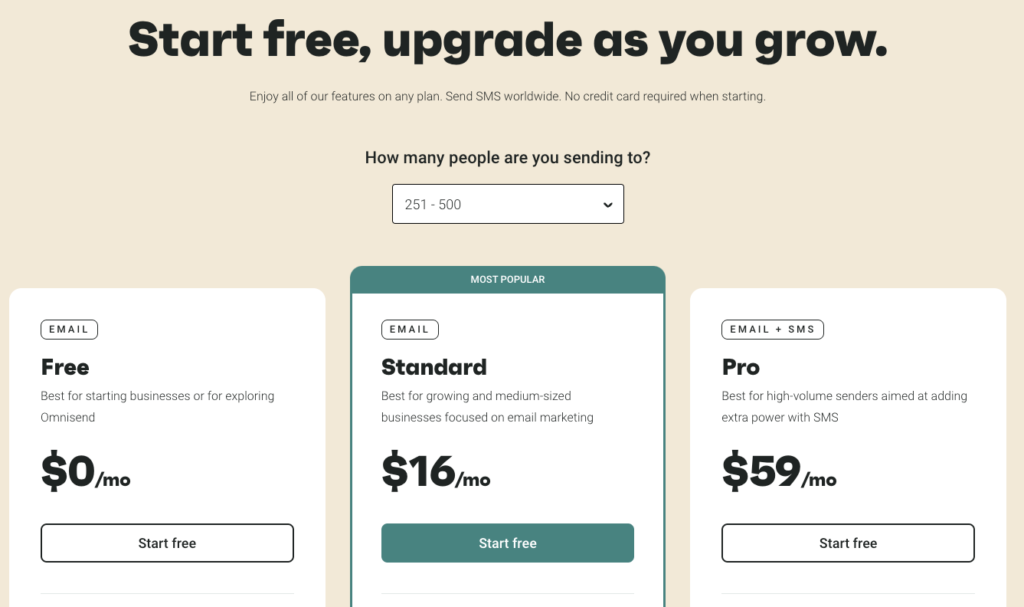

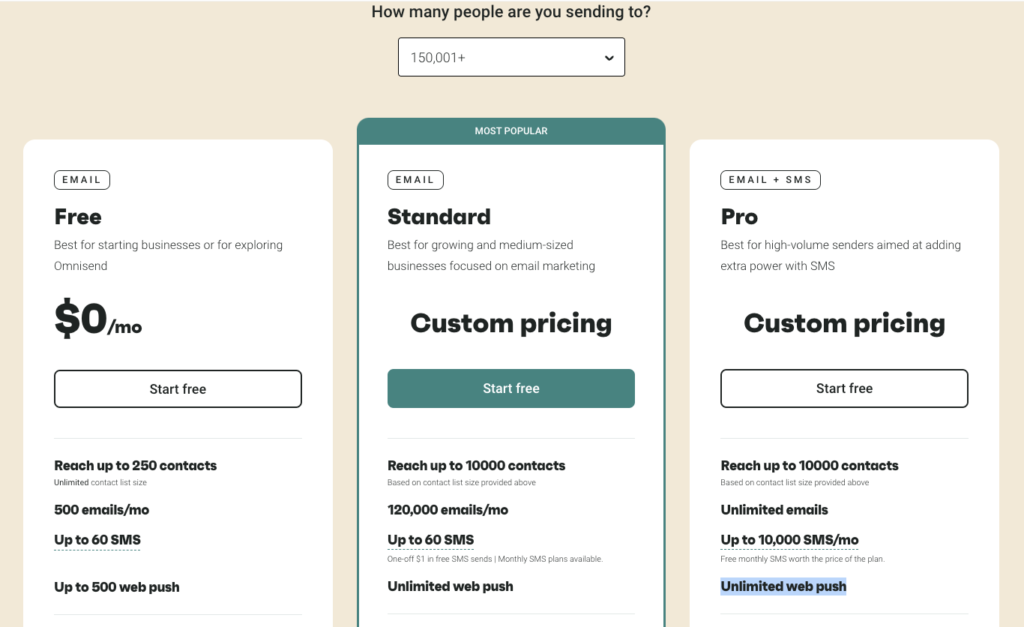
- Free Plan: Omnisend’s Free Plan allows users to send up to 500 emails per month to 250 contacts. It includes basic automation features, email templates, and sign-up forms.
- Standard Plan: Omnisend’s Free Plan allows users to send up to 24,000 emails per month to 2000 contacts. Omnisend’s Standard Plan is a paid plan that offers more advanced features, including unlimited emails, automation workflows, SMS campaigns, segmentation, and reporting. The pricing for the Standard Plan varies based on the number of subscribers, starting from a lower tier to a higher tier.
- Pro Plan: Omnisend’s Pro Plan allows users to send up to Unlimited emails to 2000 contacts, Up to 3,933 SMS/mo, Unlimited web push… Omnisend’s Pro Plan is a higher-tier plan that includes all the features of the Standard Plan, along with additional advanced features such as web push notifications, Facebook Messenger campaigns, and more. The pricing for the Pro Plan is also based on the number of subscribers.
It’s important to note that pricing may vary and Omnisend may offer additional plans or custom pricing for larger enterprises or businesses with unique requirements. It’s recommended to visit Omnisend’s official website or contact their sales team for the most up-to-date and accurate pricing information.
Methodology for Using AI Email Marketing Tools
AI email marketing tools have revolutionized the way businesses communicate with their customers. By automating tasks, personalizing content, and providing valuable insights, these tools can significantly improve email campaign effectiveness. Here’s a methodology for using AI email marketing tools:
1. Define Your Goals:
- Identify objectives: Clearly outline what you want to achieve with your email marketing campaigns, such as increasing sales, improving customer engagement, or building brand loyalty.
2. Segment Your Email List:
- Leverage AI: Use AI-powered segmentation tools to divide your email list into targeted groups based on demographics, behavior, interests, or other relevant criteria.
3. Create Personalized Content:
- Utilize AI: Employ AI-driven content generation tools to create personalized email content that resonates with each recipient.
4. Optimize Subject Lines:
- A/B testing: Use AI-powered A/B testing tools to experiment with different subject lines and determine the most effective ones.
5. Optimize Timing:
- AI-powered recommendations: Leverage AI to analyze your audience’s behavior and recommend the optimal time to send emails for maximum engagement.
6. Monitor and Analyze:
- Track performance: Use AI-powered analytics tools to track key metrics such as open rates, click-through rates, and conversions.
- Identify trends: Analyze data to identify patterns and trends that can inform your future email marketing strategies.
7. Continuously Improve:
- Iterate and refine: Based on your analysis, make adjustments to your email campaigns to improve performance.
- Stay updated: Keep up with the latest AI advancements in email marketing to ensure your campaigns remain effective.
Key AI Features to Look for in Email Marketing Tools:
- Predictive analytics: AI-powered tools can predict future behavior and preferences based on historical data.
- Natural language processing: These tools can understand and interpret natural language, allowing for more personalized content.
- Automation: AI can automate tasks such as email scheduling, list segmentation, and A/B testing.
- Integration: Look for tools that integrate with your existing CRM and marketing automation platforms.
This methodology and leveraging the power of AI email marketing tools, you can create more targeted, personalized, and effective campaigns that drive results.

